The document provides an overview of functional programming concepts introduced in Java 8, detailing features such as default methods in interfaces, lambda expressions, and the use of Optional and Streams. It illustrates these concepts with examples, including a vehicle instrumentation interface and various implementations like car and aircraft that demonstrate the use of default methods. Additionally, it covers the use of functional interfaces, method referencing, and the benefits of using streams for data processing, while emphasizing the importance of immutability and safety against null values.

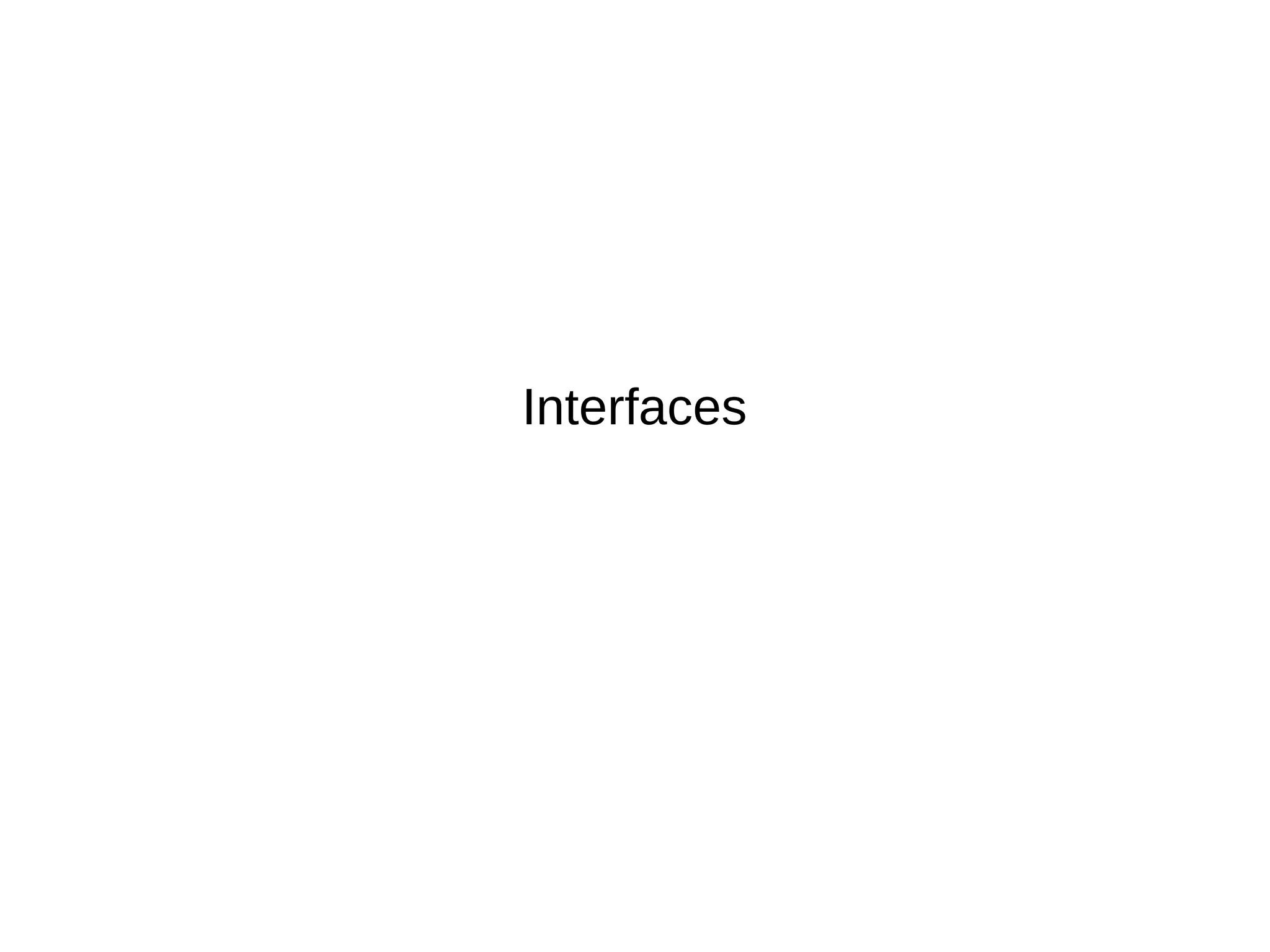
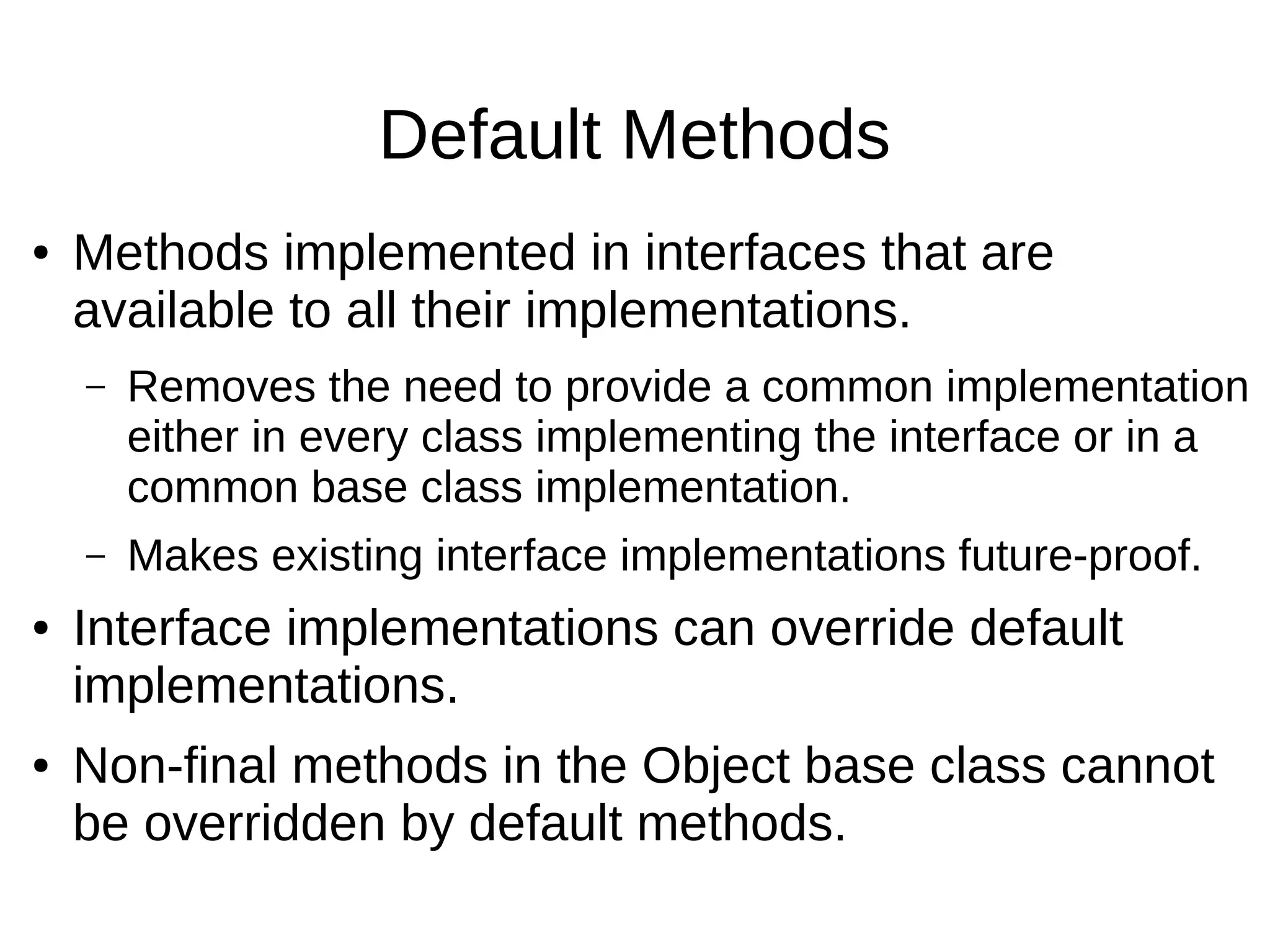
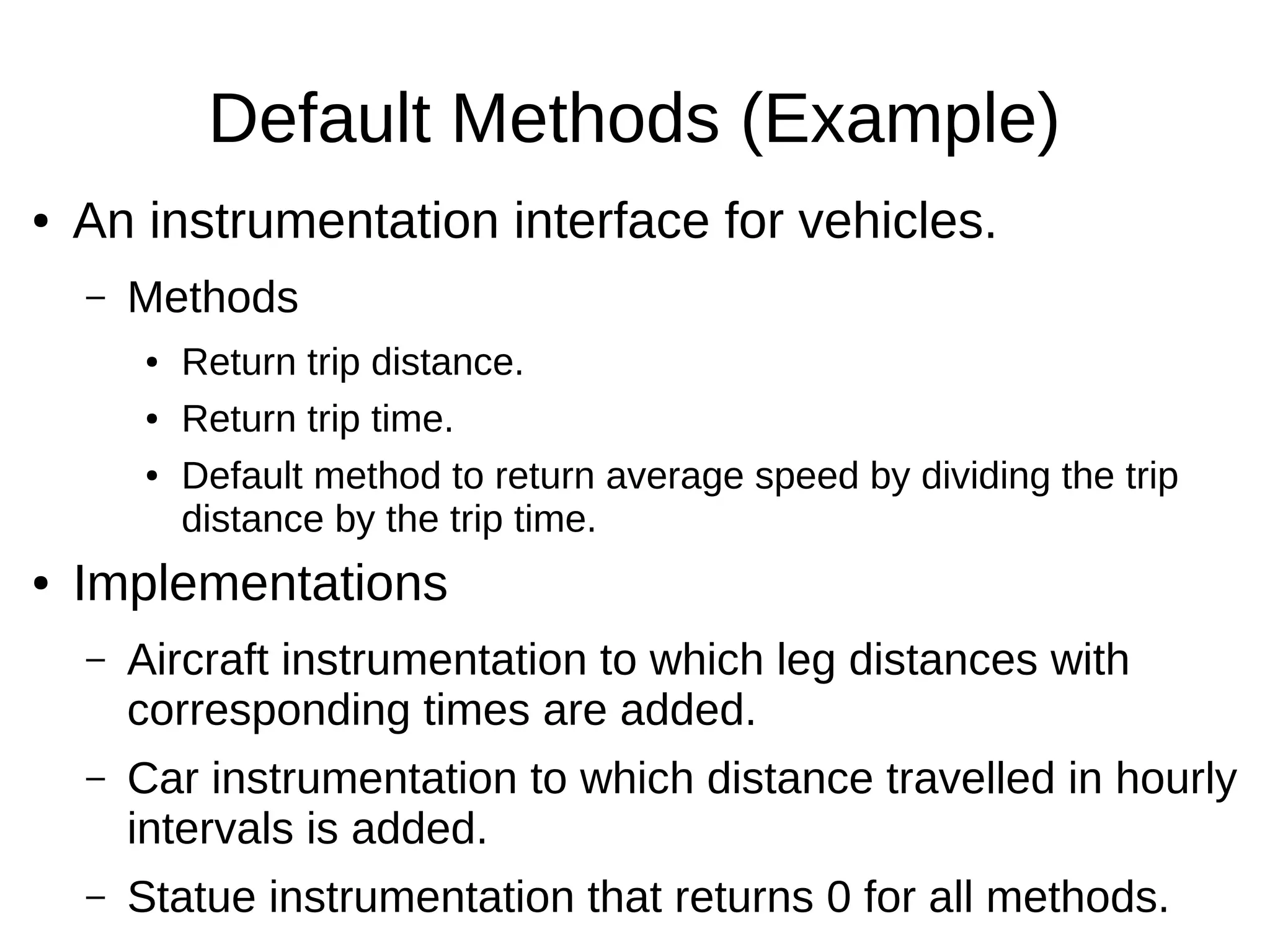
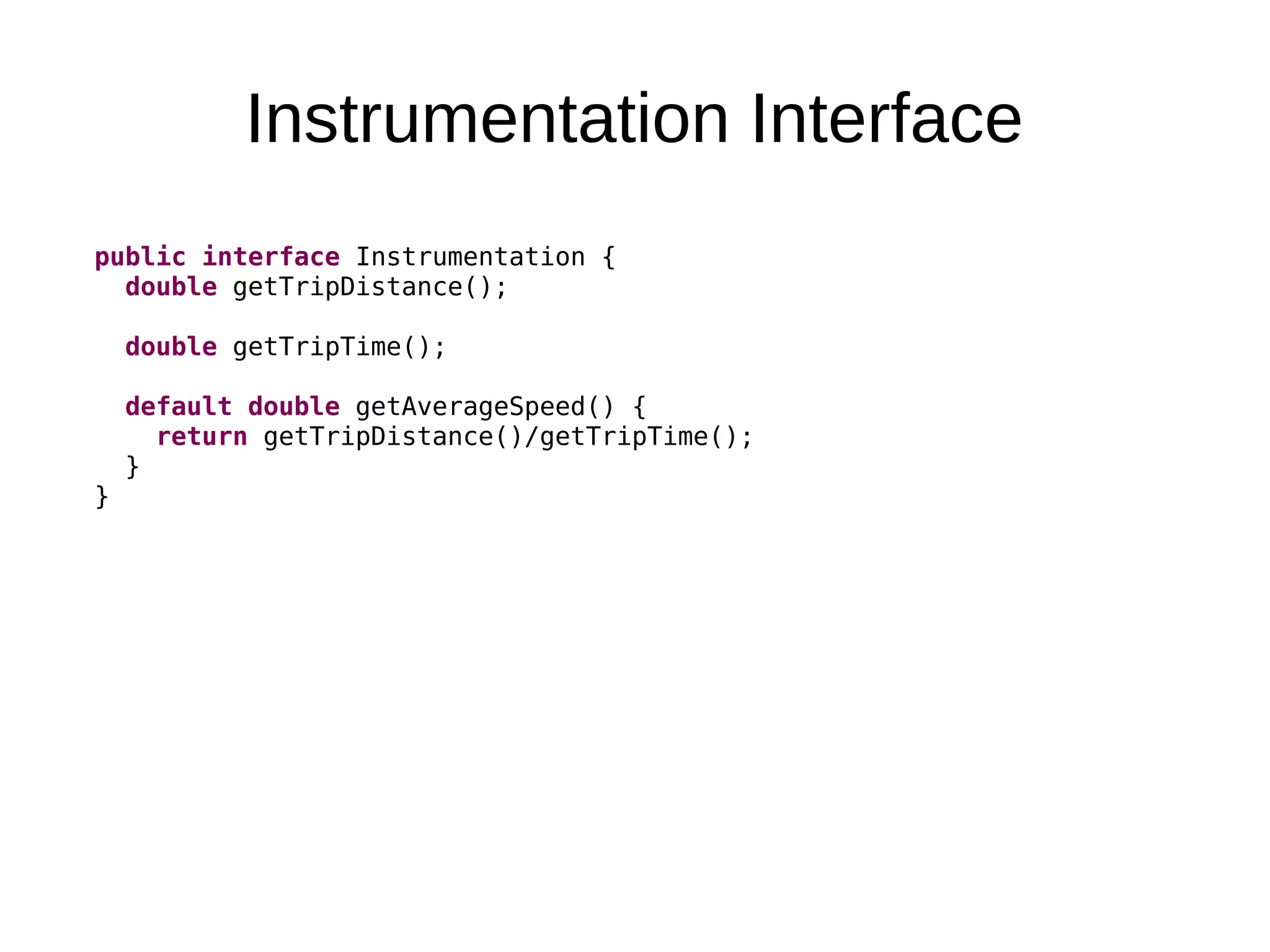
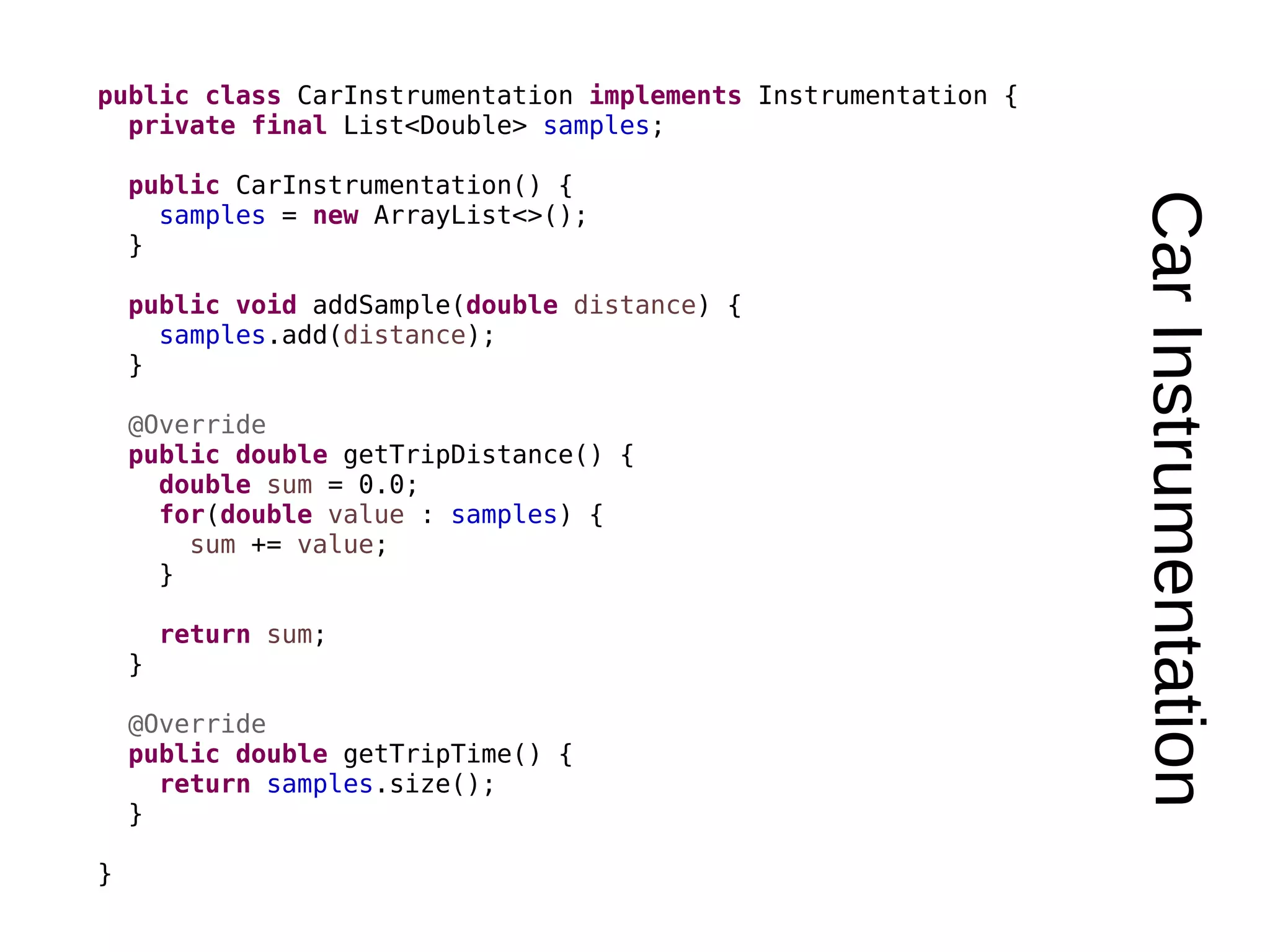
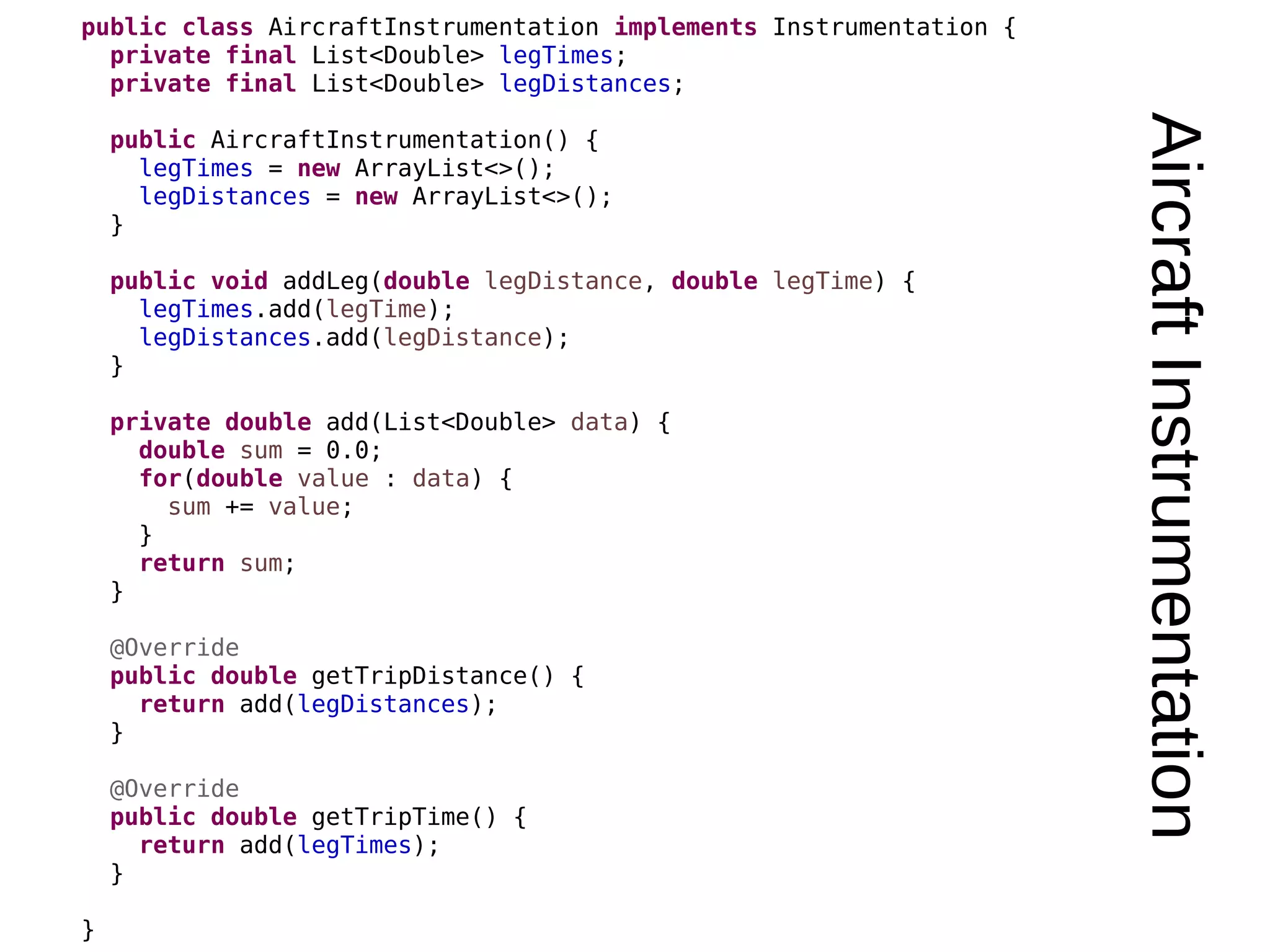
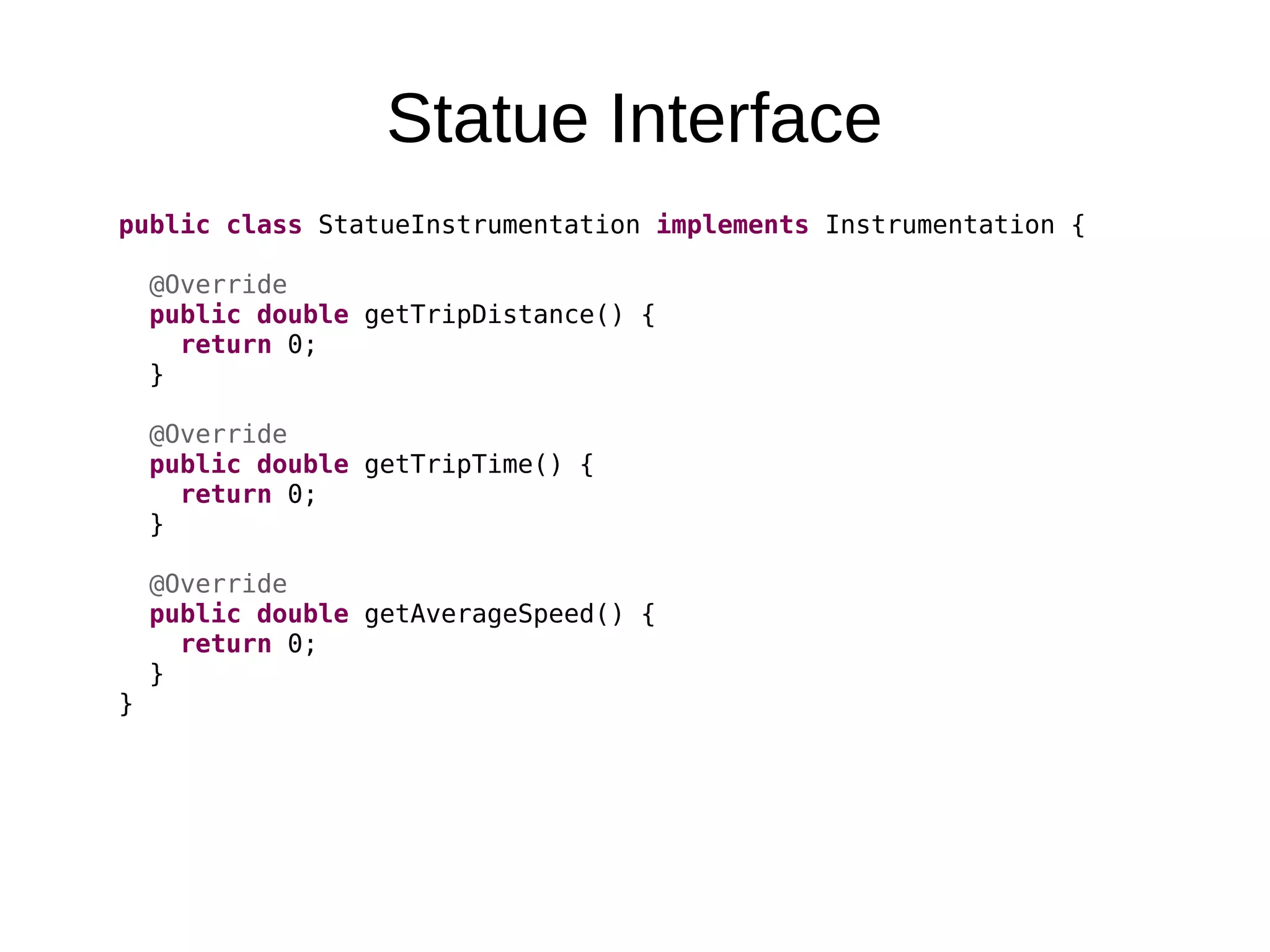
![Example public static void main(String[] args) { System.out.printf("Statue speed = %.2fn", new StatueInstrumentation().getAverageSpeed()); CarInstrumentation carInst = new CarInstrumentation(); carInst.addSample(50); carInst.addSample(70); carInst.addSample(60); System.out.printf("Car speed = %.2fn", carInst.getAverageSpeed()); AircraftInstrumentation planeInst = new AircraftInstrumentation(); planeInst.addLeg(70, 1.5); planeInst.addLeg(25, 0.25); planeInst.addLeg(75, 1.25); planeInst.addLeg(110, 1); System.out.printf("Plane speed = %.2fn", planeInst.getAverageSpeed()); }](https://image.slidesharecdn.com/notes-160817213536/75/Functional-Programming-in-Java-8-9-2048.jpg)
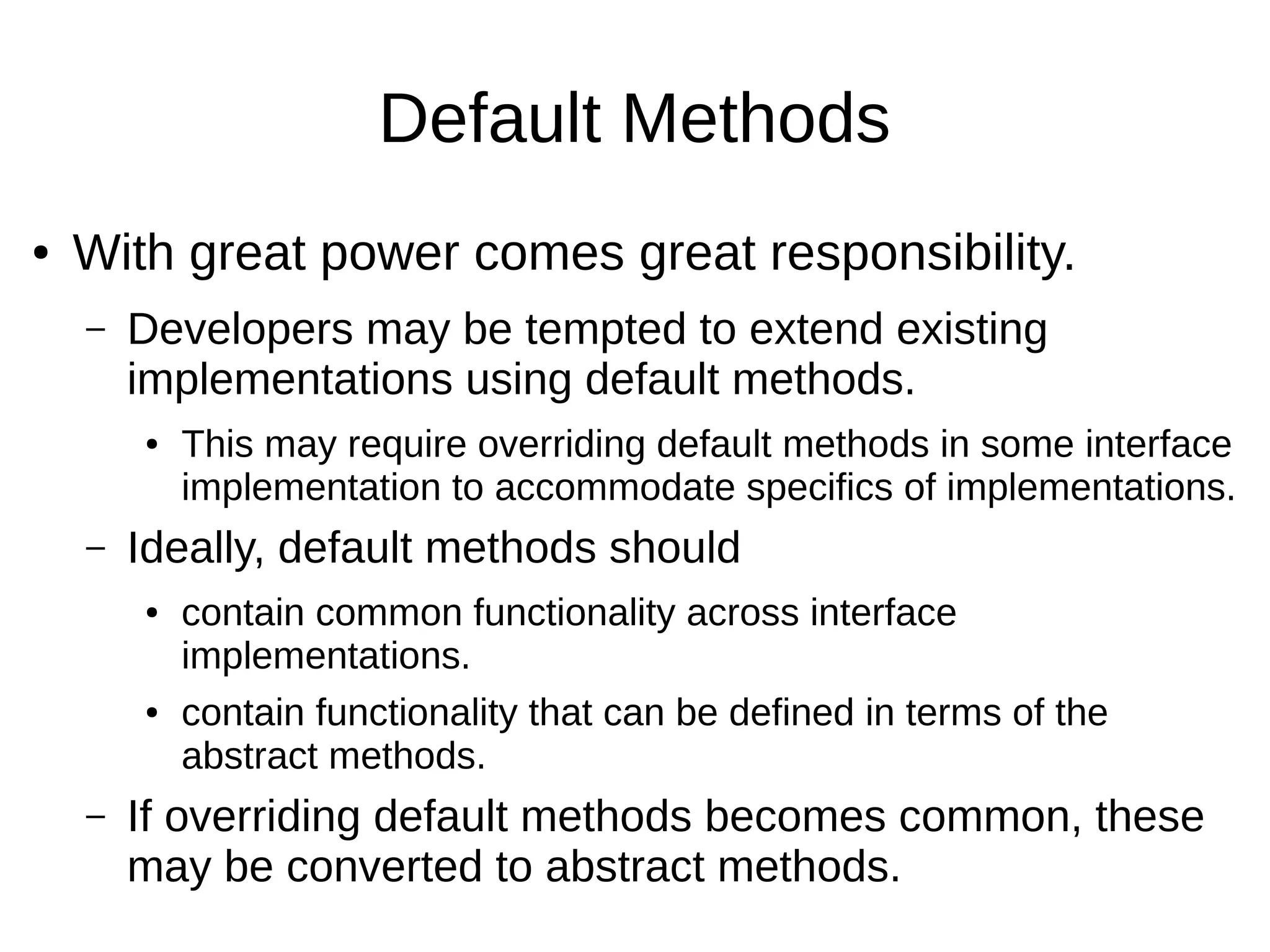
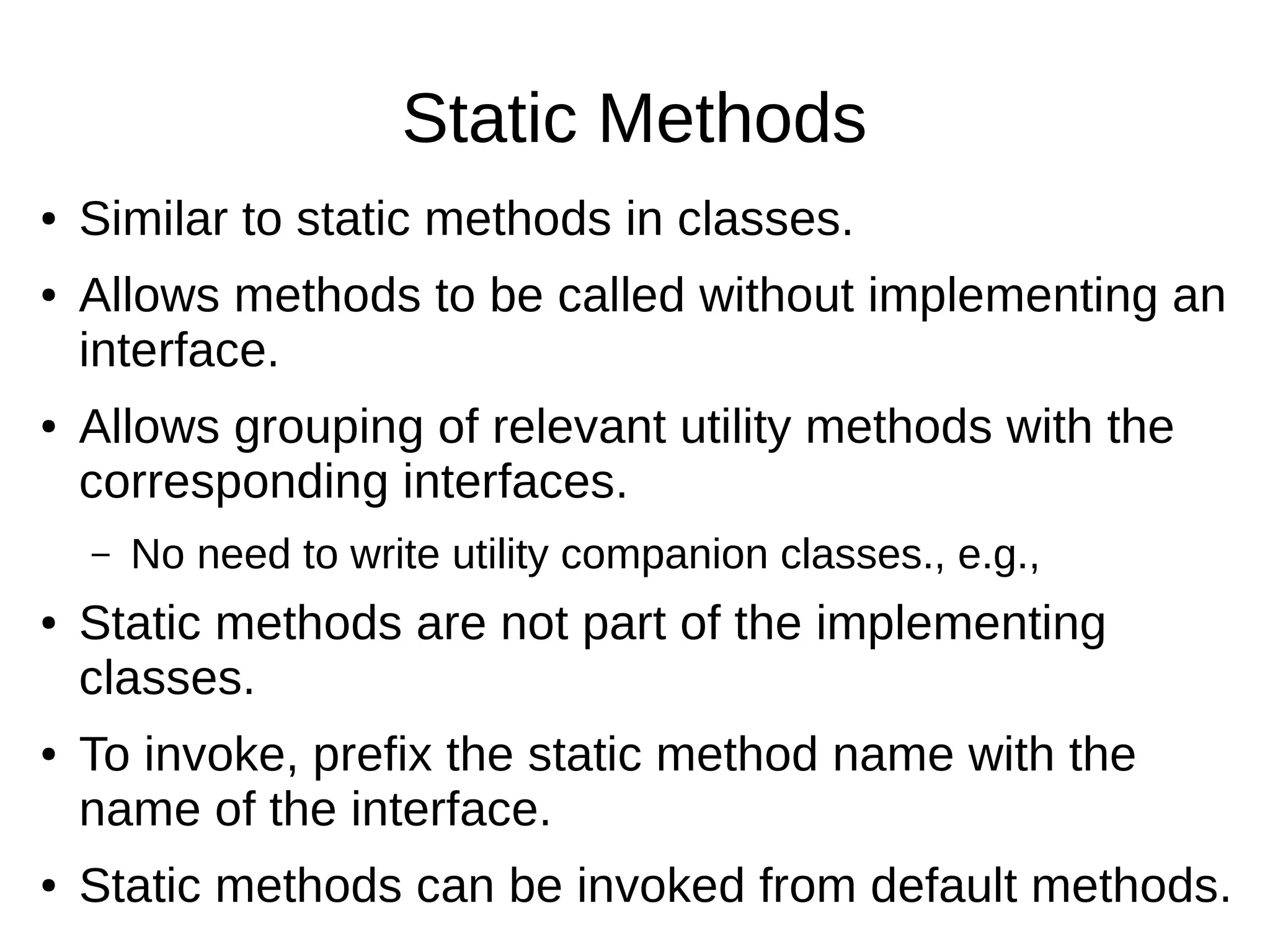
![StaticMethods(Example) public interface Calculator { static double add(double a, double b) { return a + b; } static double subtract(double a, double b) { return a - b; } static double multiply(double a, double b) { return a * b; } static double divide(double a, double b) { return a / b; } } public static void main(String[] args) { double a = 5.0; double b = 2.5; System.out.println(Calculator.add(a, b)); System.out.println(Calculator.subtract(a, b)); System.out.println(Calculator.multiply(a, b)); System.out.println(Calculator.divide(a, b)); } Usage](https://image.slidesharecdn.com/notes-160817213536/75/Functional-Programming-in-Java-8-12-2048.jpg)
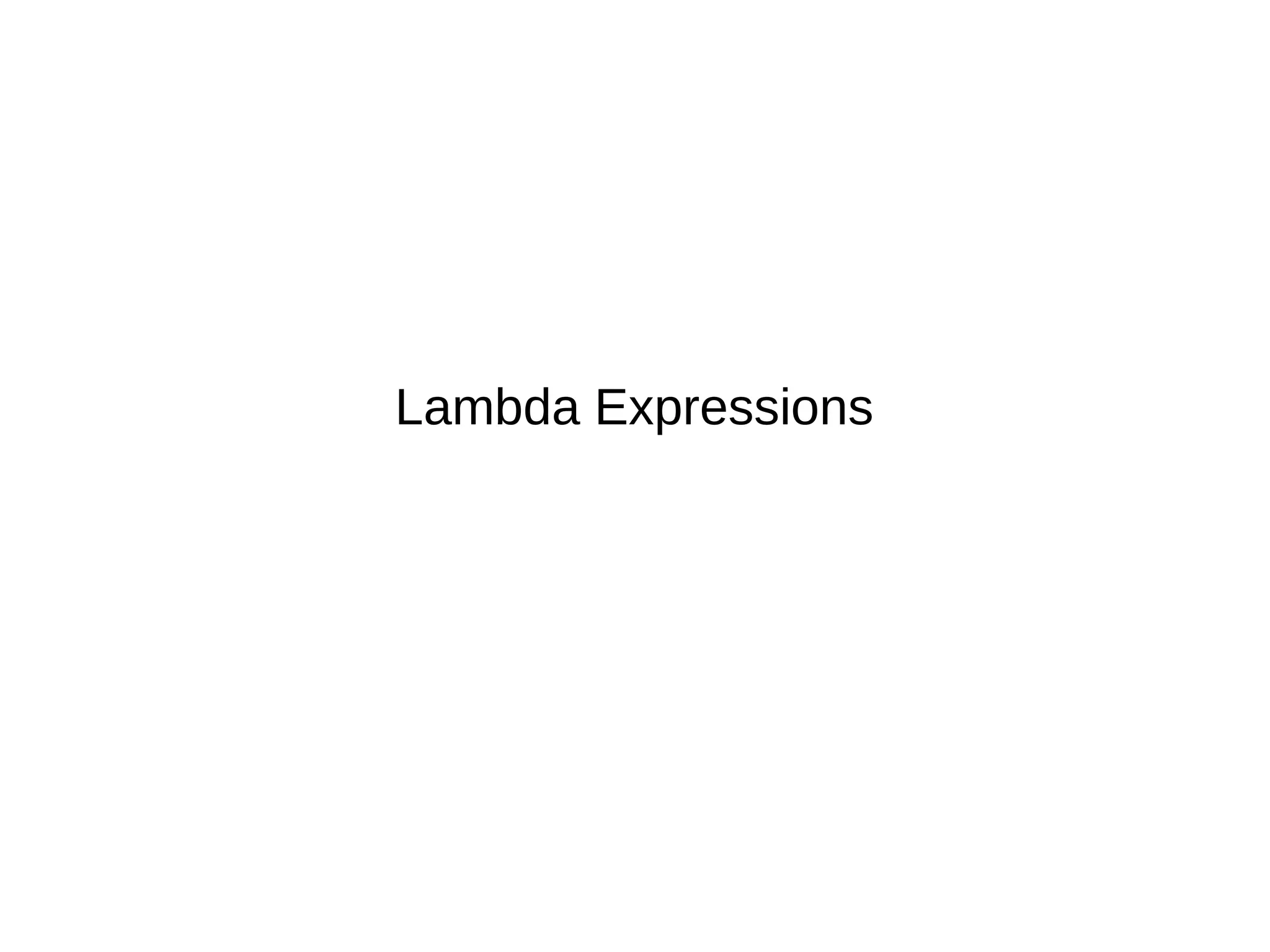
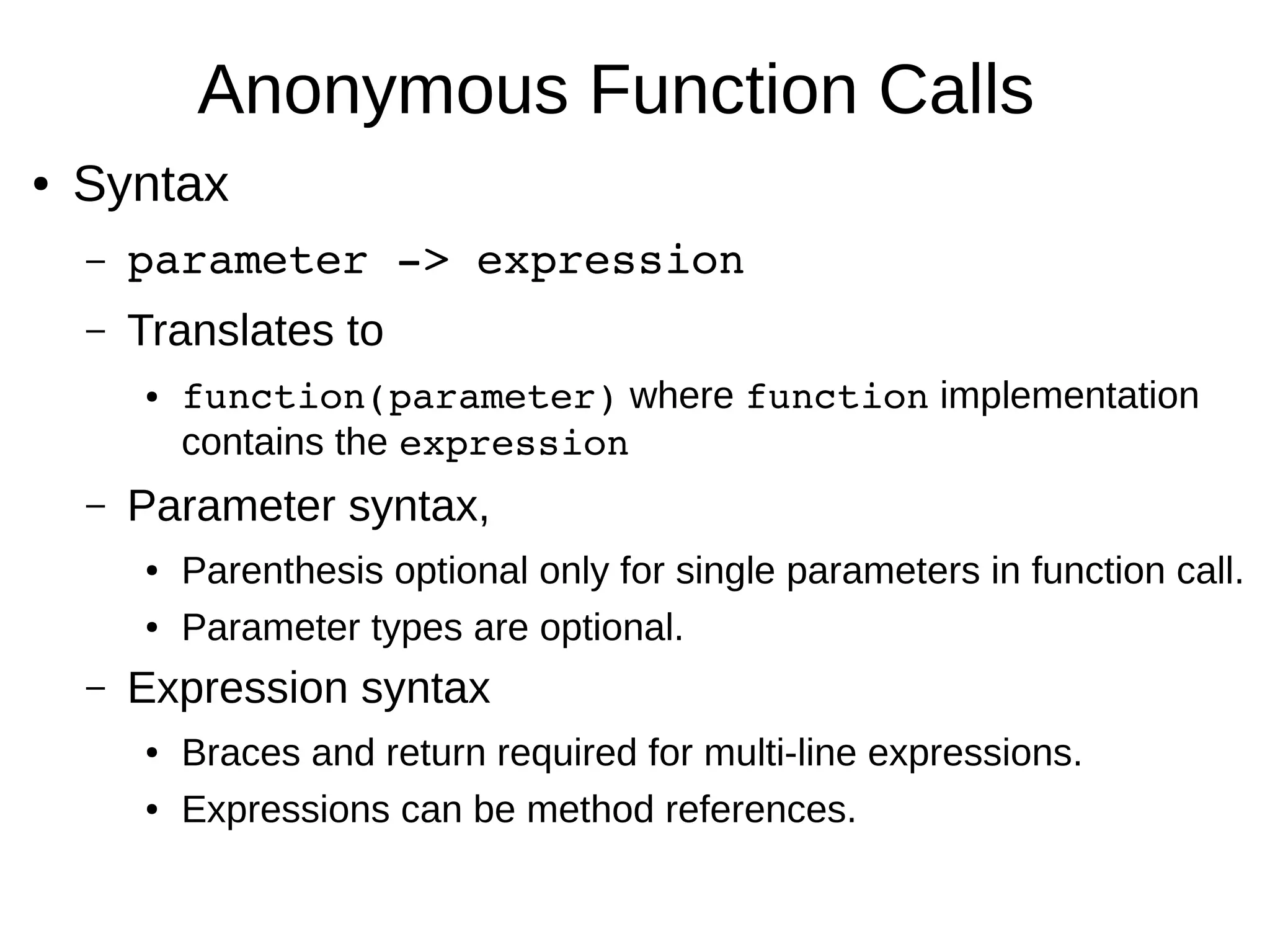
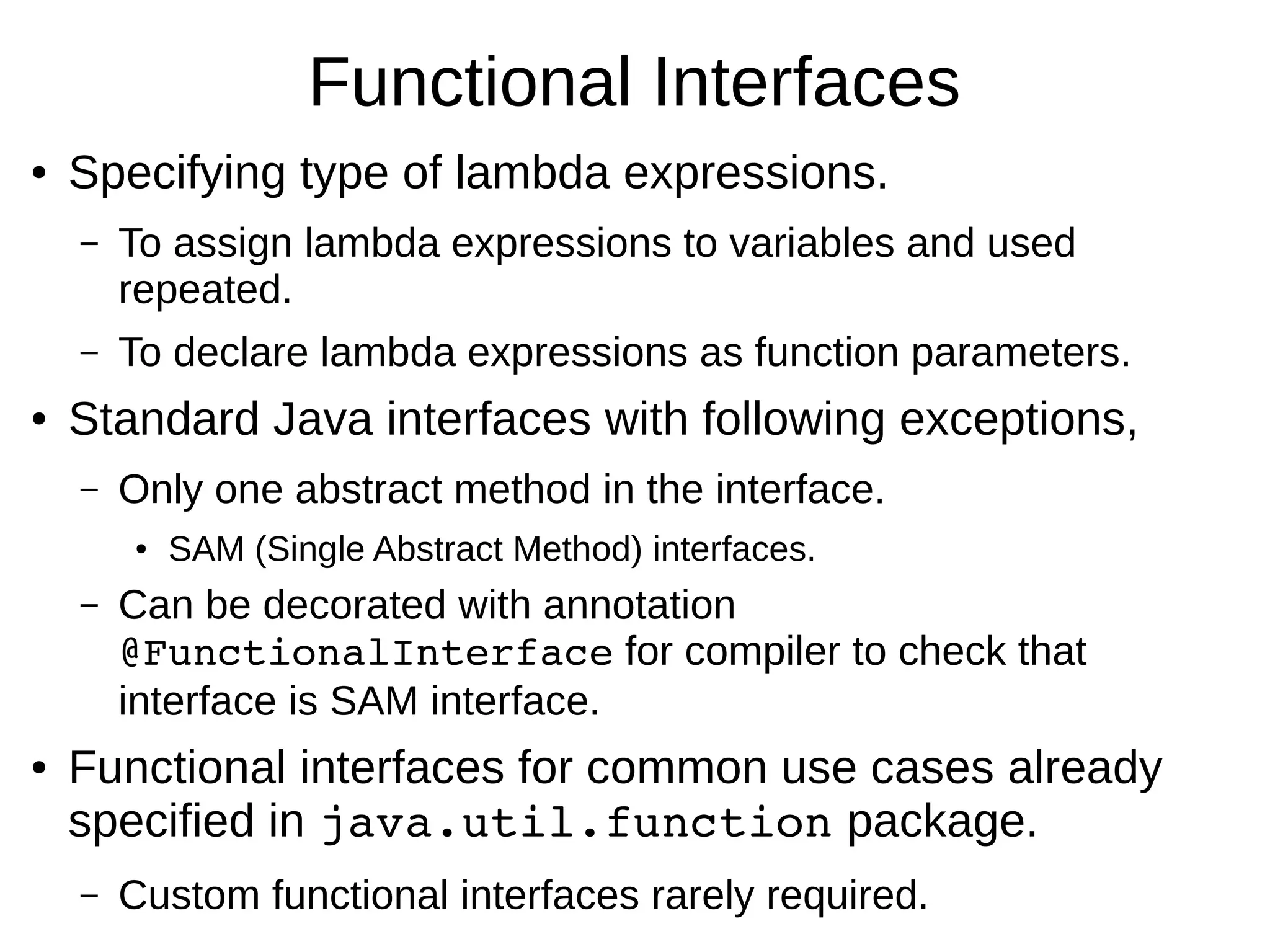
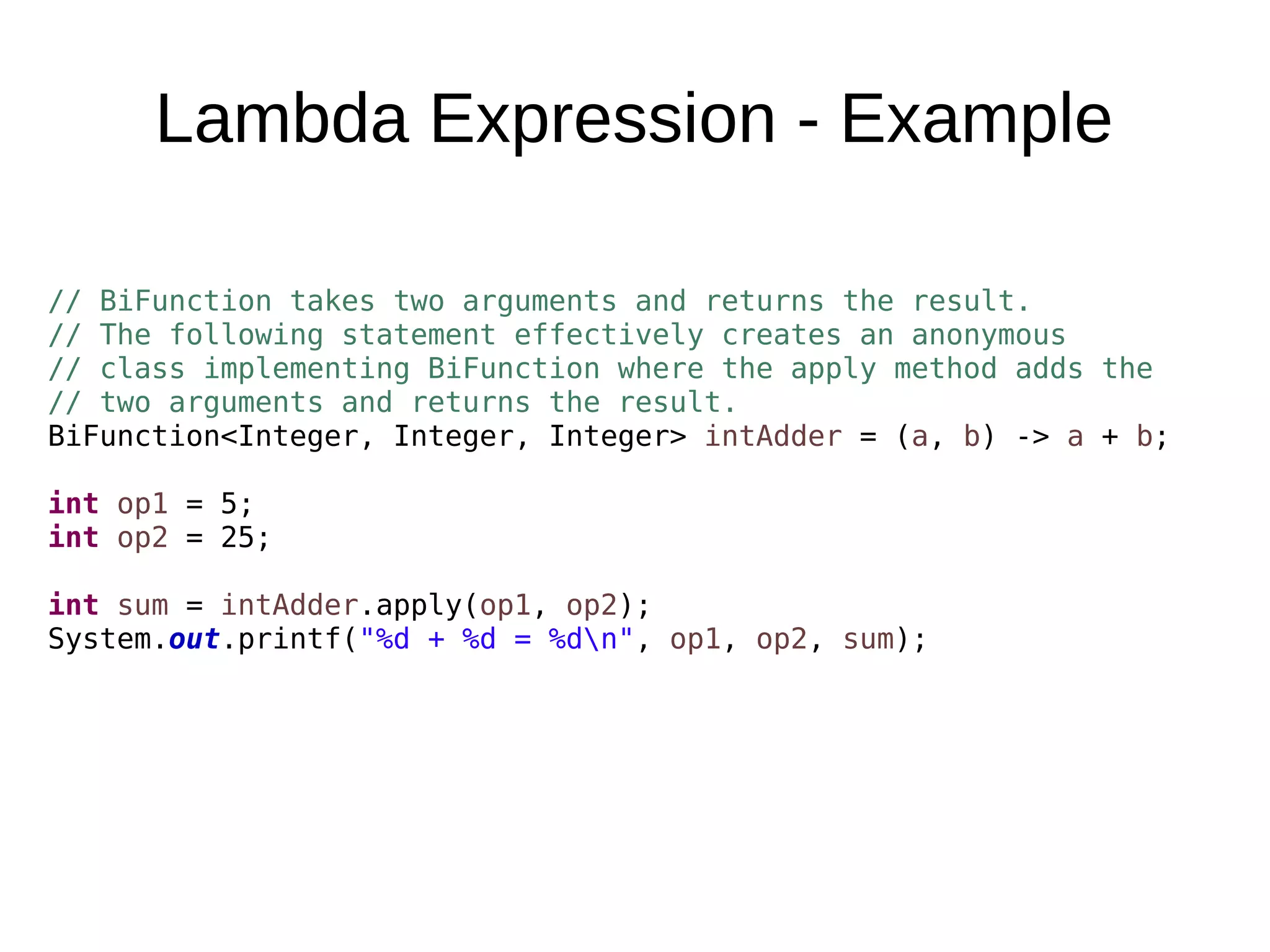
![Lambda Expression - Example public static void main(String[] args) { int op1 = 25; int op2 = 5; int sum = process(op1, op2, (a, b) -> a + b); int diff = process(op1, op2, (a, b) -> a - b); int product = process(op1, op2, (a, b) -> a * b); int div = process(op1, op2, (a, b) -> a / b); System.out.printf("%d + %d = %dn", op1, op2, sum); System.out.printf("%d - %d = %dn", op1, op2, diff); System.out.printf("%d * %d = %dn", op1, op2, product); System.out.printf("%d / %d = %dn", op1, op2, div); } private static int process( int x, int y, BiFunction<Integer, Integer, Integer> processor) { return processor.apply(x, y); }](https://image.slidesharecdn.com/notes-160817213536/75/Functional-Programming-in-Java-8-17-2048.jpg)
![Lambda Expression - Example public class FunctionalCalculator { public static void main(String[] args) { if (args.length == 3) { Map<String, BiFunction<Double, Double, Double>> calculator = new HashMap<>(); calculator.put("+", (a, b) -> a + b); calculator.put("-", (a, b) -> a - b); calculator.put("*", (a, b) -> a * b); calculator.put("/", (a, b) -> a / b); String operator = args[1]; if (calculator.containsKey(operator)) { Double operand1 = Double.parseDouble(args[0]); Double operand2 = Double.parseDouble(args[2]); double result = calculator.get(operator).apply(operand1, operand2); System.out.printf("%.2f %s %.2f = %.2f", operand1, operator, operand2, result); } else { System.out.printf("Operator %s not recognisedn", operator); System.out.println("Operators:: +, -, *, /"); } } else { System.out.println("USAGE:: Command line arguments operand1 operator operand2"); System.out.println("Operators:: +, -, *, /"); } } }](https://image.slidesharecdn.com/notes-160817213536/75/Functional-Programming-in-Java-8-18-2048.jpg)
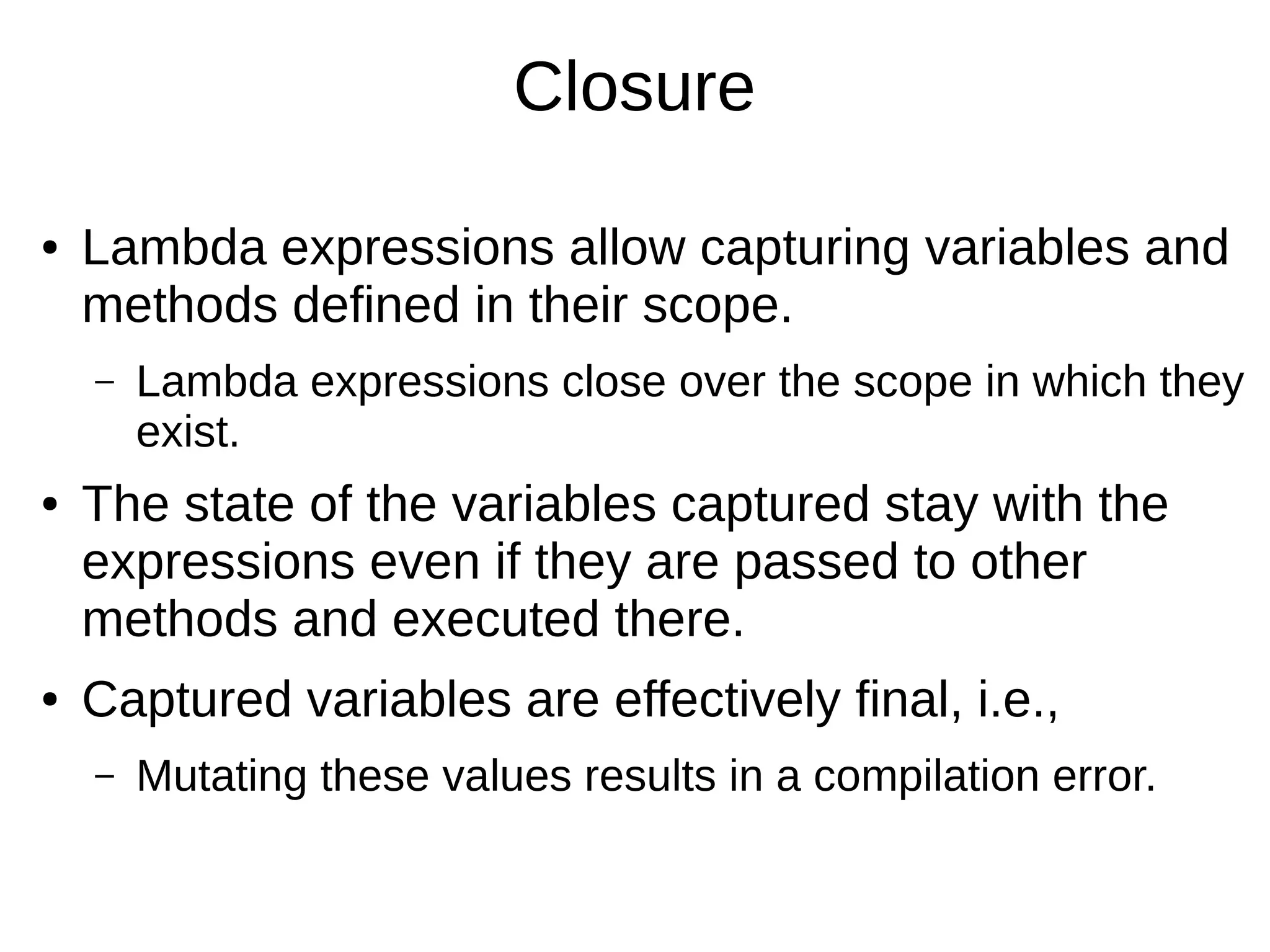
![Closure-Example public class WeightCalculator { final double mass; public WeightCalculator(double mass) { this.mass = mass; } public Function<Double, Double> getCalculator() { return g -> this.getWeight(mass, g); } private double getWeight(double m, double g) { return m * g; } } public static void main(String[] args) { double mass = 10; Function<Double, Double> calculator = new WeightCalculator(mass).getCalculator(); double weightOnEarth = calculator.apply(9.8); double weightOnMars = calculator.apply(3.77); System.out.printf("%.2f kg on Earth is %.2f N on Earthn", mass, weightOnEarth); System.out.printf("%.2f kg on Earth is %.2f N on Marsn", mass, weightOnMars); }](https://image.slidesharecdn.com/notes-160817213536/75/Functional-Programming-in-Java-8-20-2048.jpg)
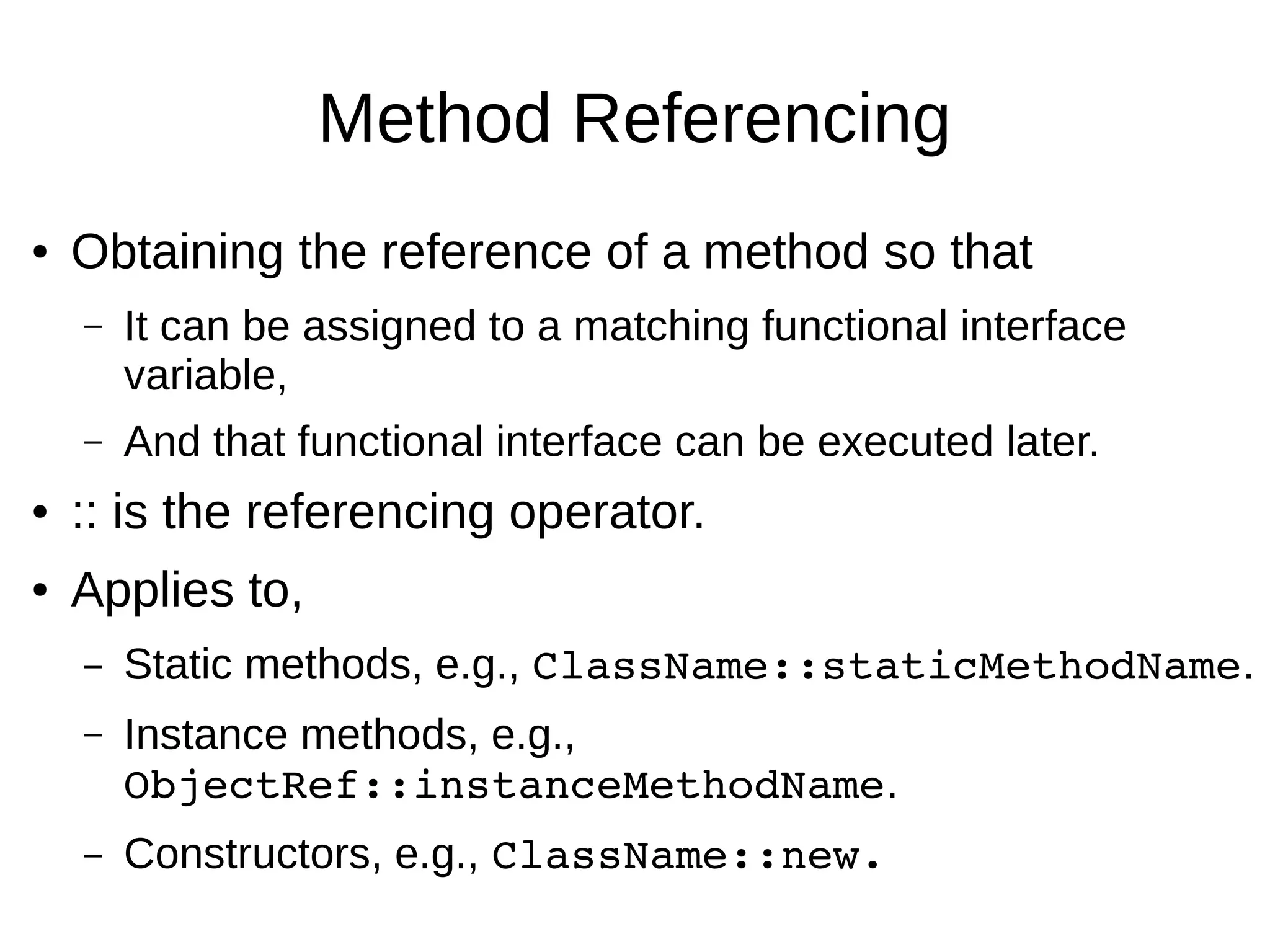
![MethodReferencing- Example public class Doubler { public static double doubleIt(double value) { return 2 * value; } } public static void main(String[] args) { Function<Double, Double> doubler = Doubler::doubleIt; Consumer<String> printer = System.out::println; Function<Double, Double> maker = Double::new; workIt(doubler, printer, maker, 3); } private static void workIt( Function<Double, Double> worker, Consumer<String> consumer, Function<Double, Double> creater, double value) { double result = worker.apply(value); consumer.accept(creater.apply(result).toString()); }](https://image.slidesharecdn.com/notes-160817213536/75/Functional-Programming-in-Java-8-22-2048.jpg)

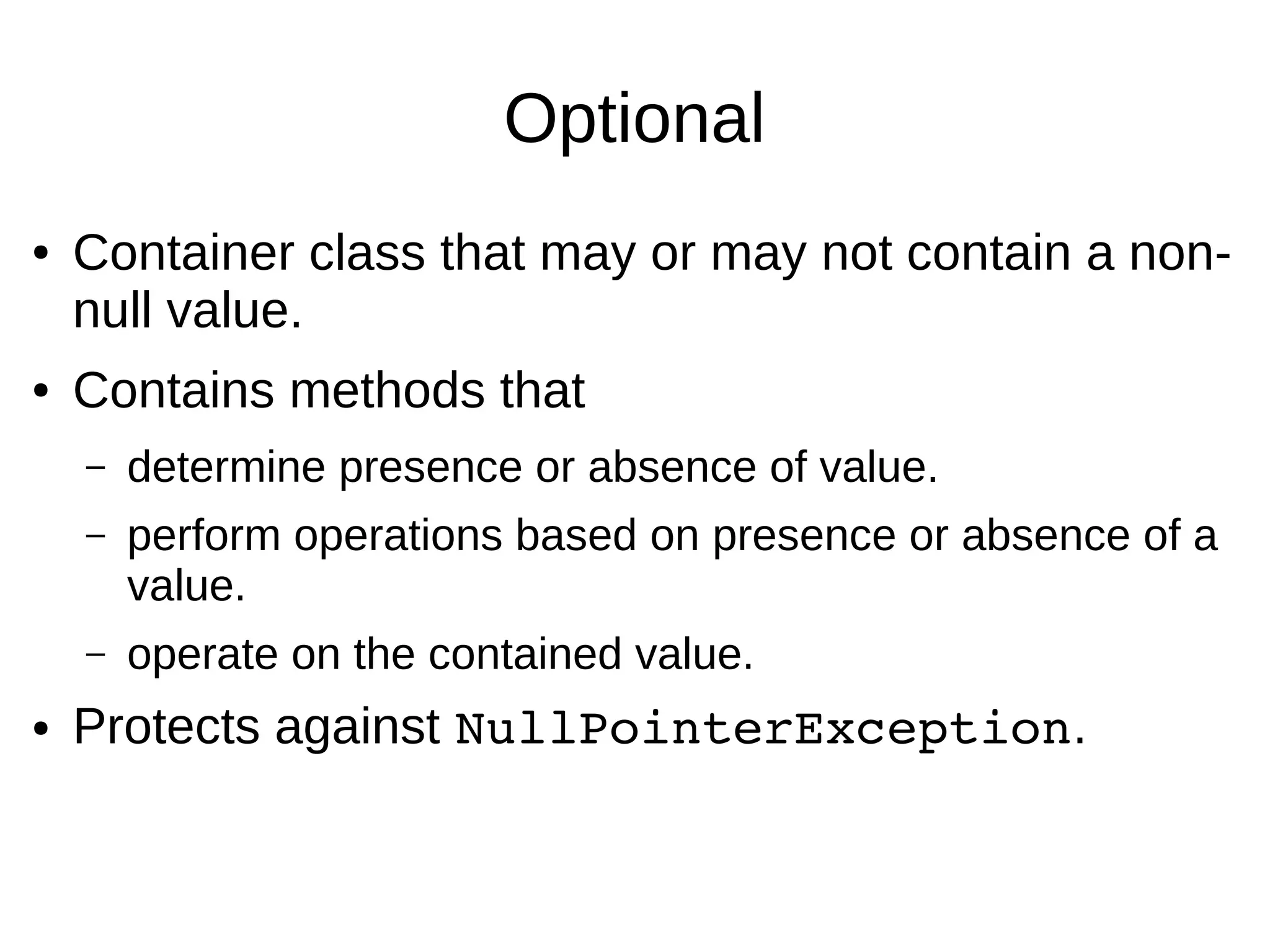
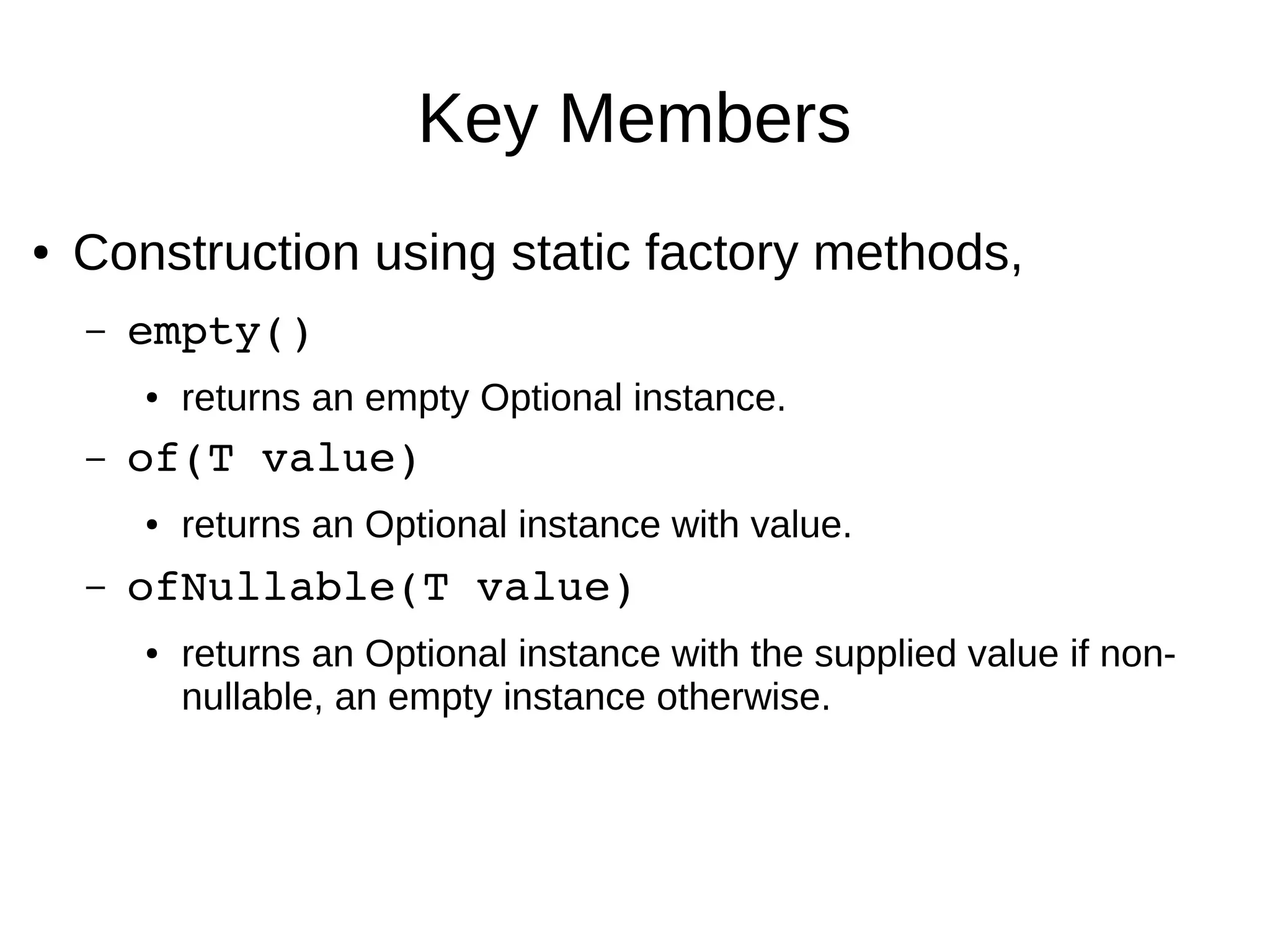
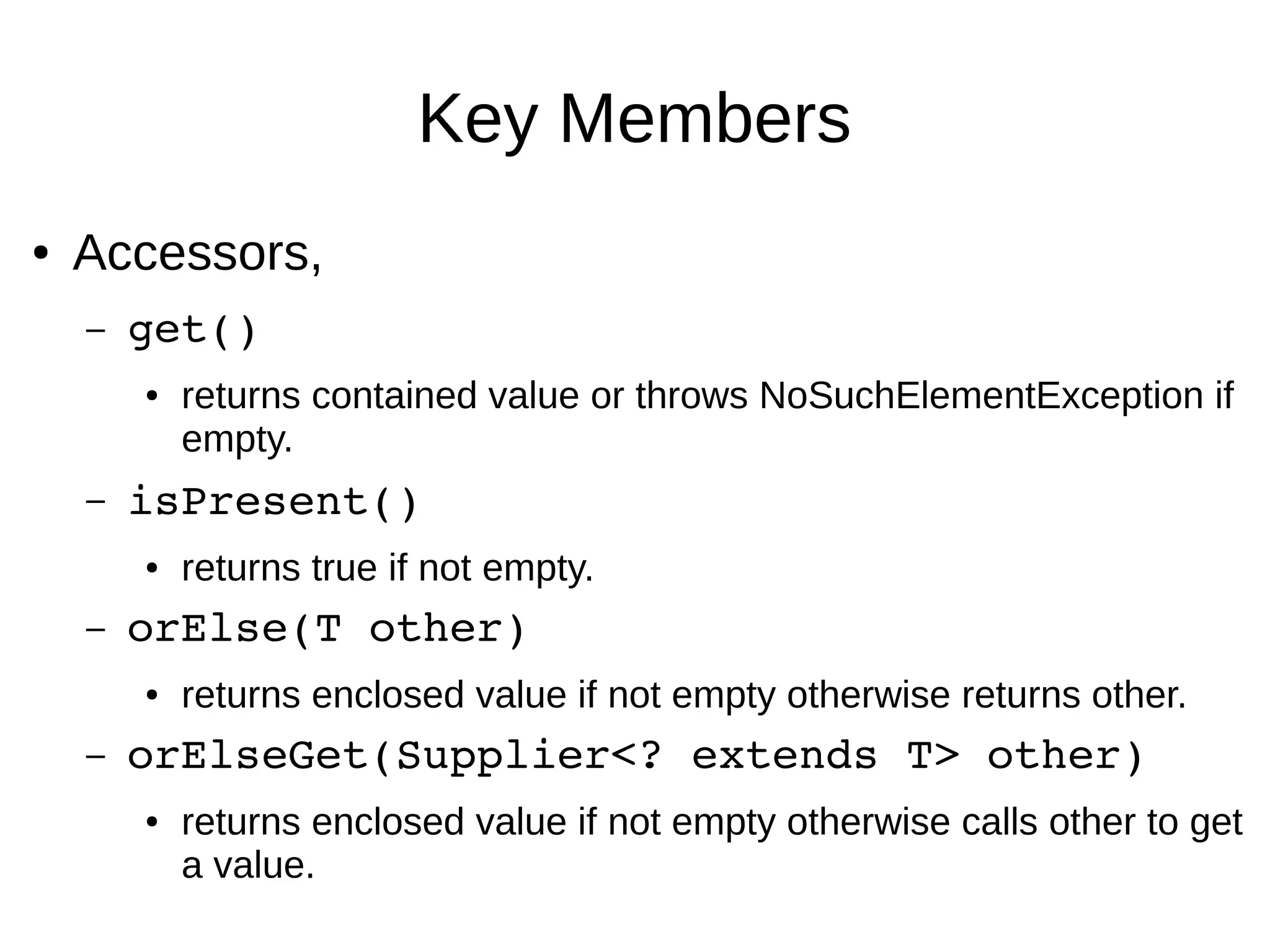
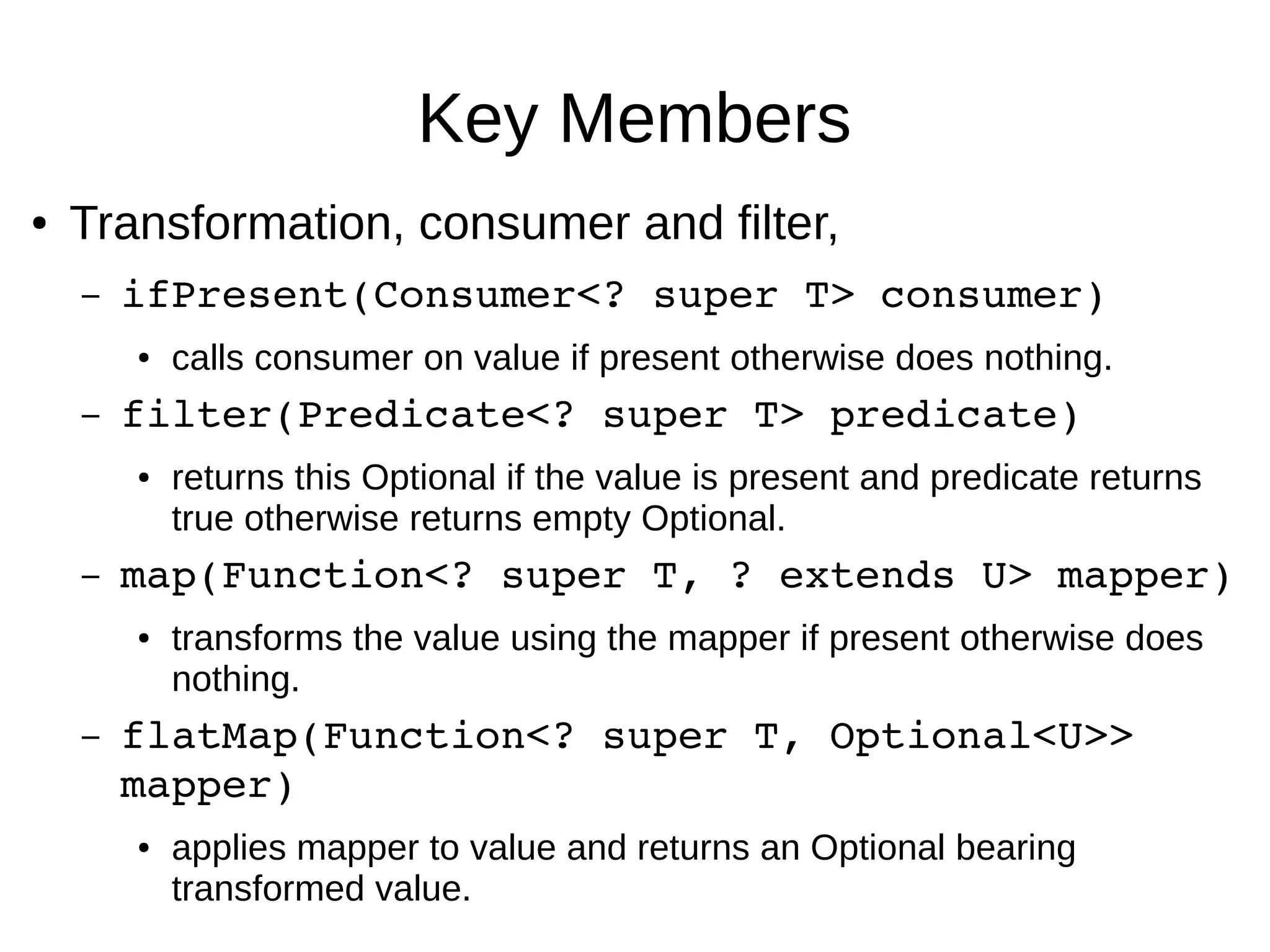
![Optional-Example /** * Find at matching name from the list and if present. print the value * after converting it into uppercase. * @param args */ public static void main(String[] args) { List<String> names = Arrays.asList("George Patton", "Omar Bradley", "Bernard Montgomery", "Erwin Romel"); Optional<String> name = find(names, "Brad"); name.map(x -> x.toUpperCase()).ifPresent(x -> System.out.println(x)); System.out.println("DONE"); } private static Optional<String> find(List<String> names, String value) { Optional<String> result = Optional.empty(); boolean found = false; Iterator<String> itr = names.iterator(); while (!found && itr.hasNext()) { String item = itr.next(); if (item.contains(value)) { found = true; result = Optional.of(item); } } return result; }](https://image.slidesharecdn.com/notes-160817213536/75/Functional-Programming-in-Java-8-28-2048.jpg)

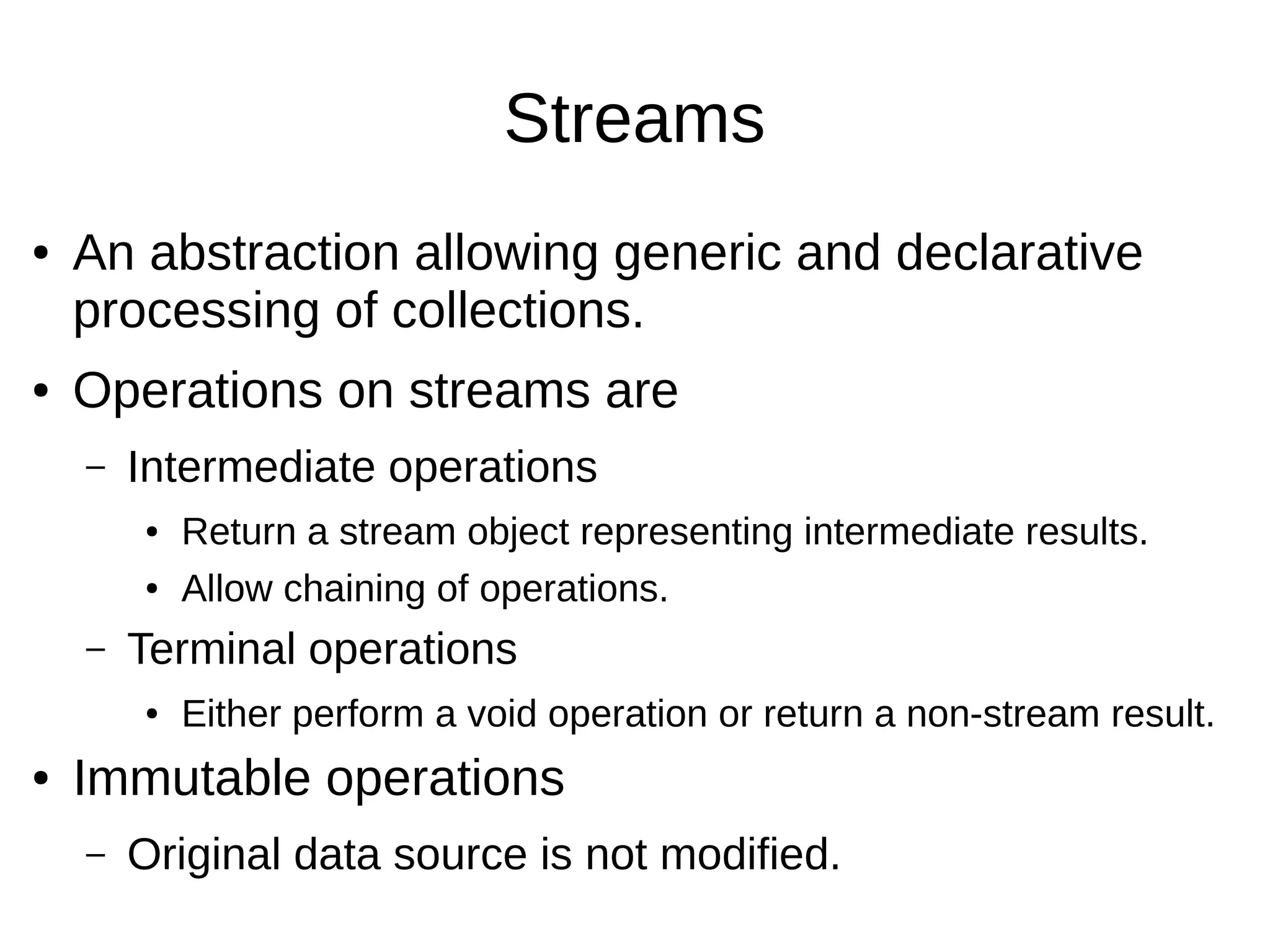
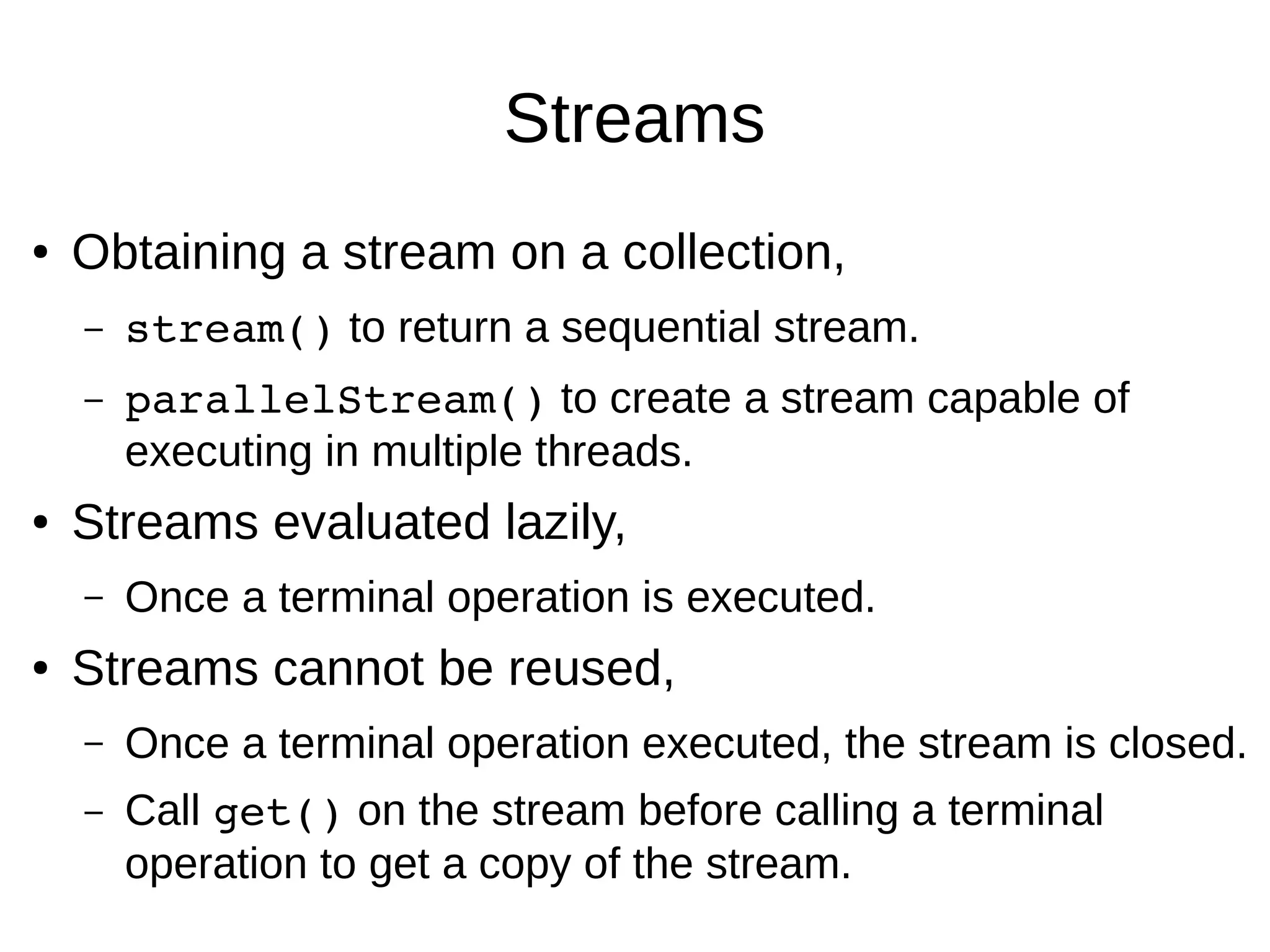
![Streams - Example public class Finder { /** * Find at matching name from the list and if present. print the * value after converting it into uppercase. * @param args */ public static void main(String[] args) { List<String> names = Arrays.asList("George Patton", "Omar Bradley", "Bernard Montgomery", "Erwin Romel"); Optional<String> name = names.stream(). filter(x -> x.contains("Bernard")).findFirst(); name.map(x -> x.toUpperCase()). ifPresent(x -> System.out.println(x)); System.out.println("Done"); } }](https://image.slidesharecdn.com/notes-160817213536/75/Functional-Programming-in-Java-8-32-2048.jpg)
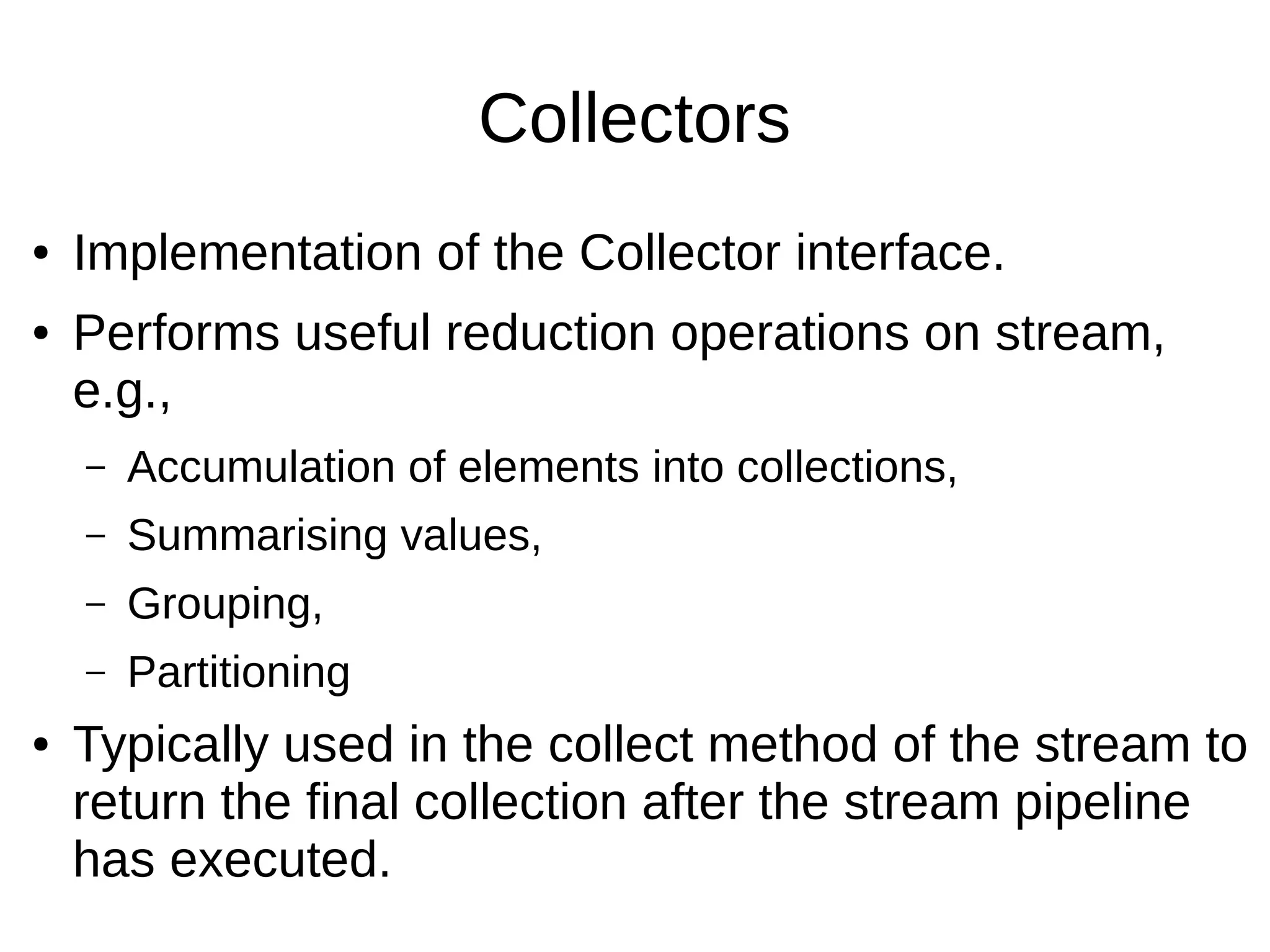
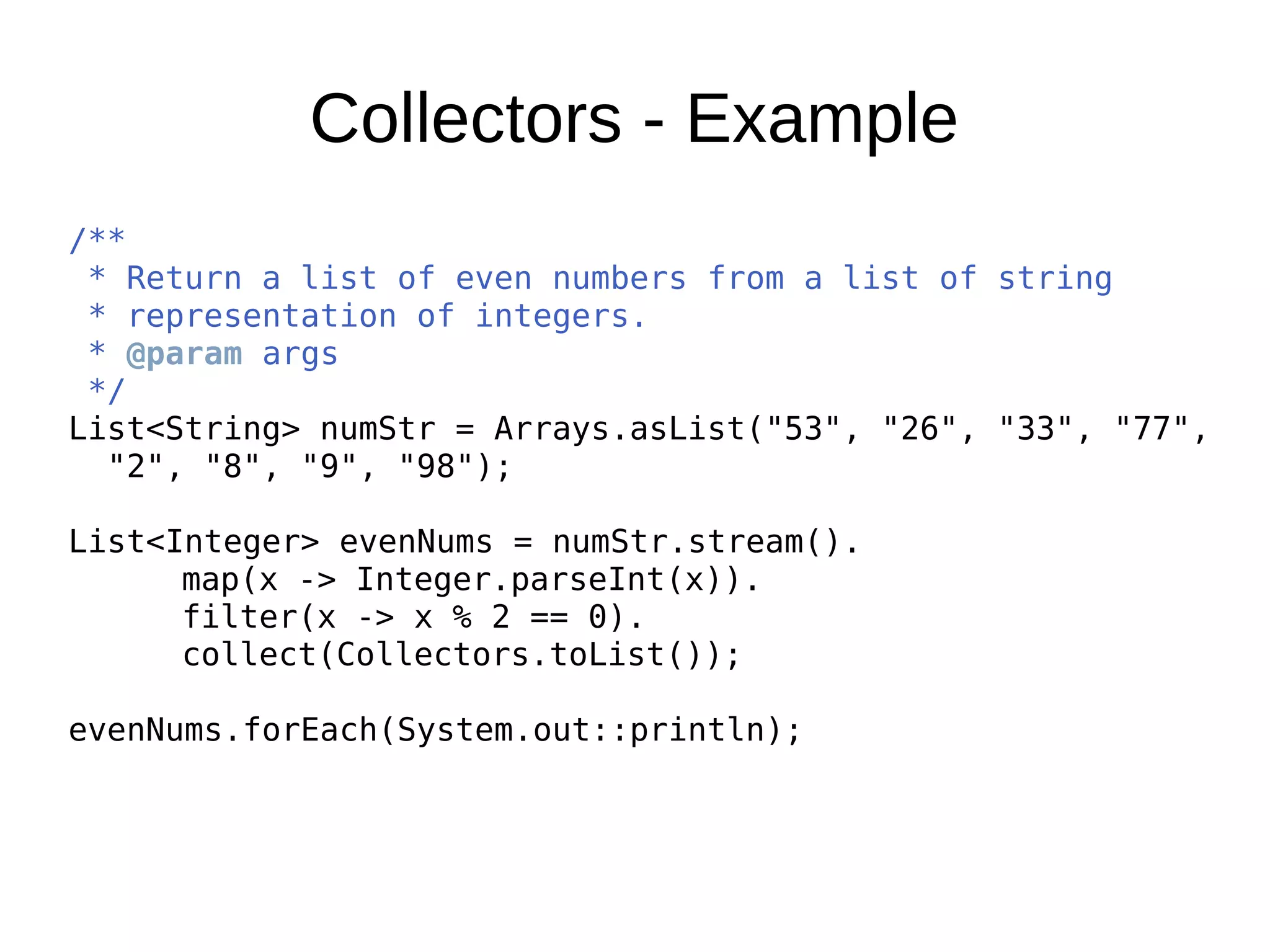
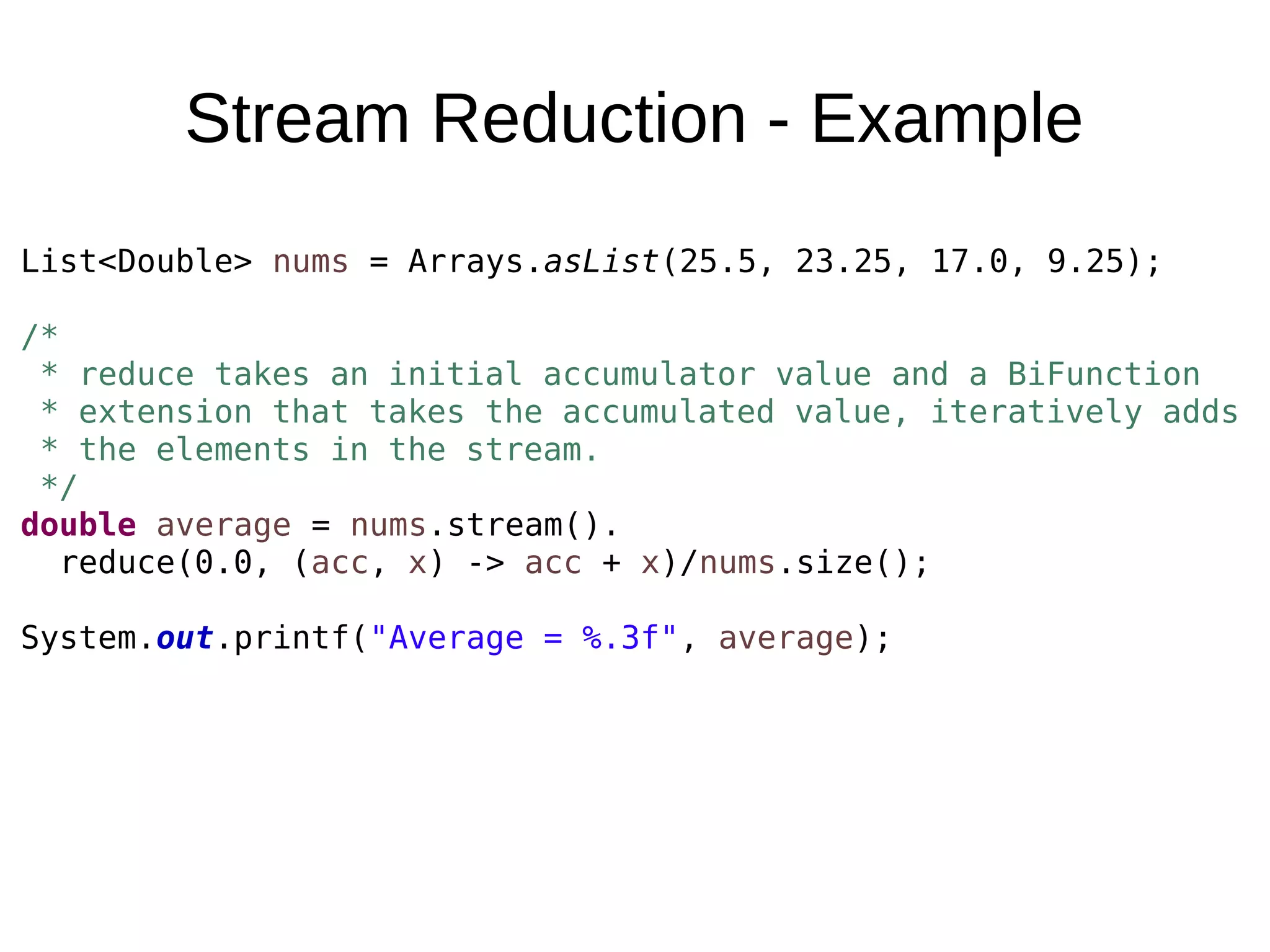
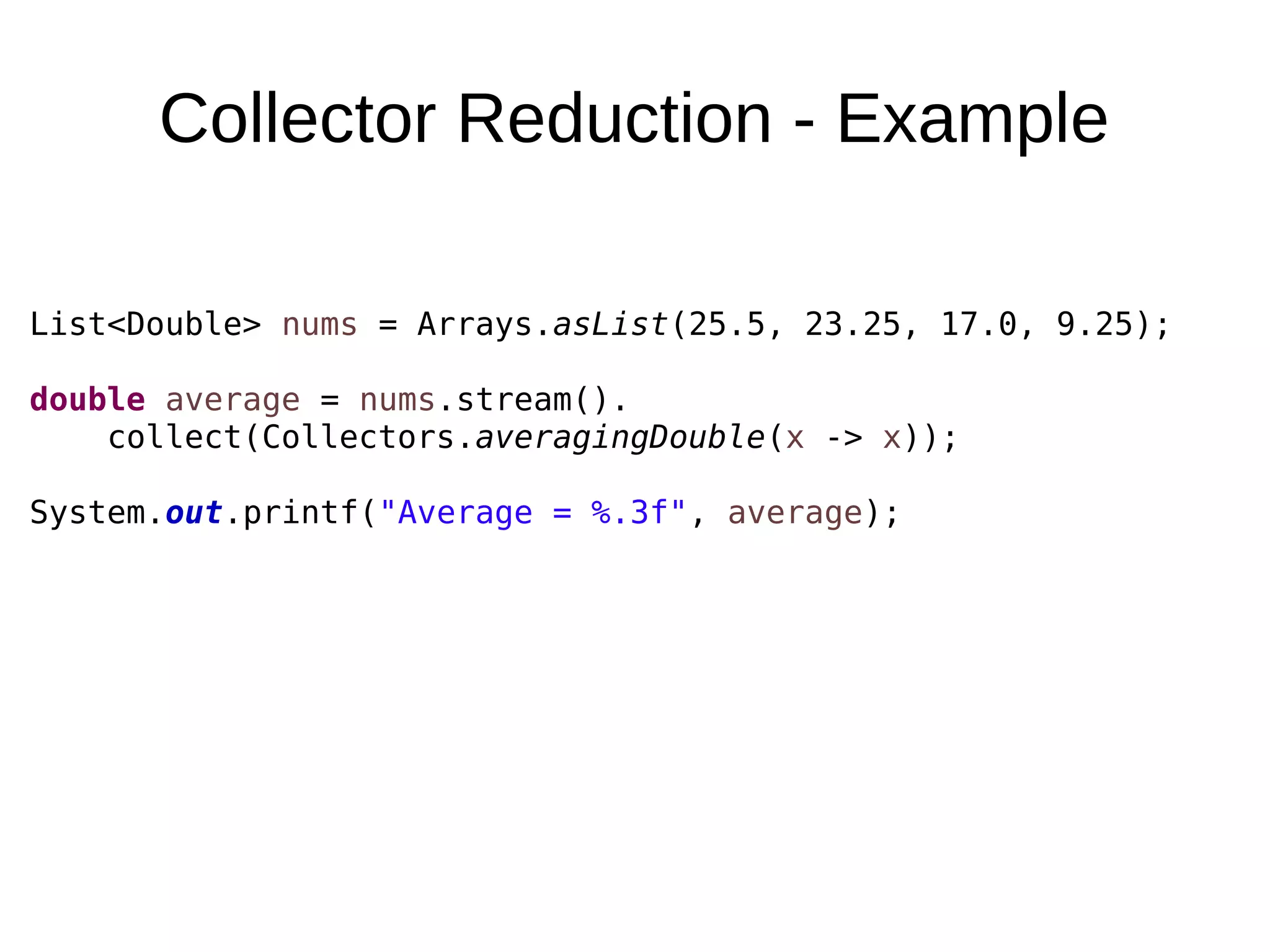
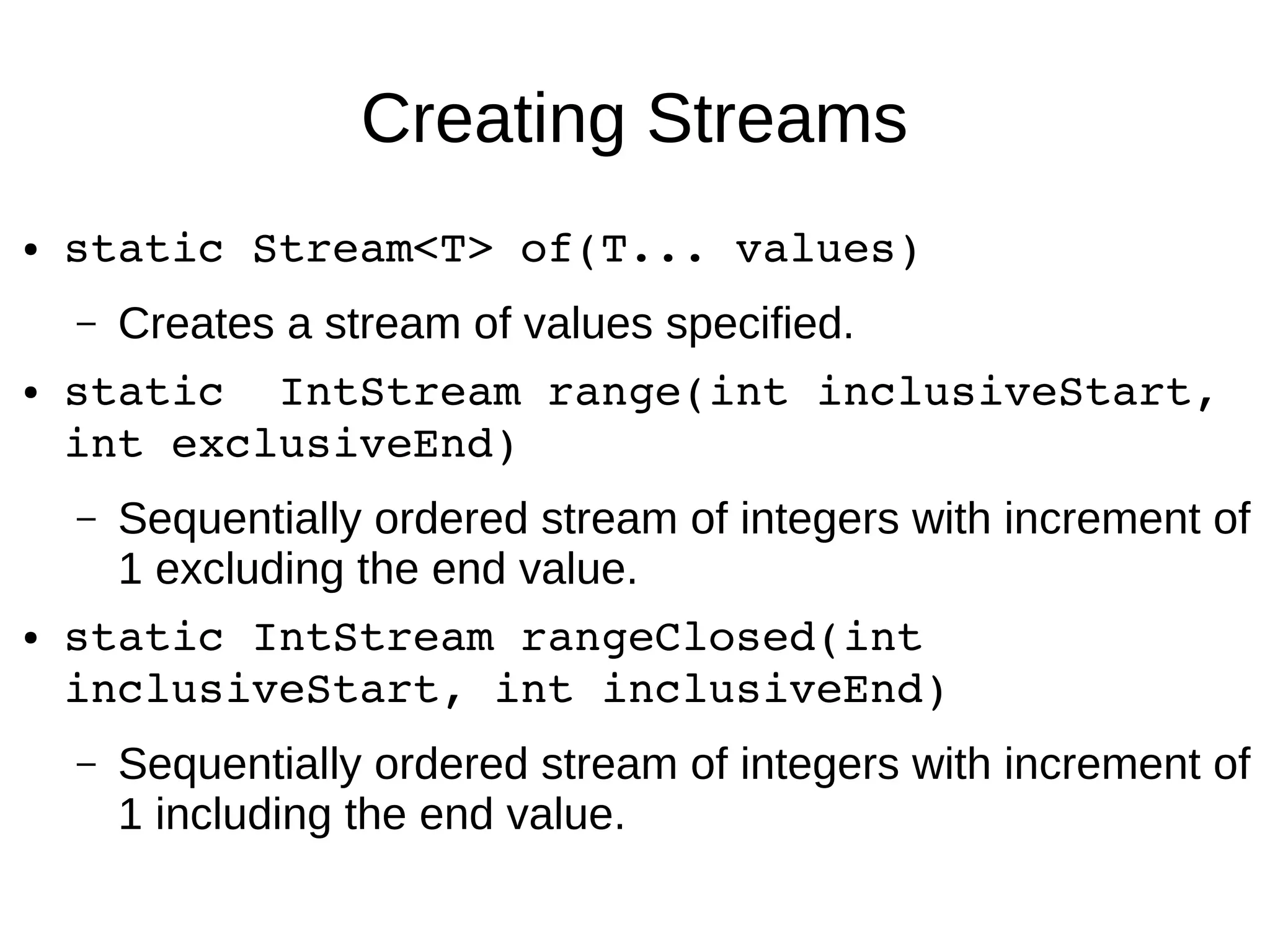
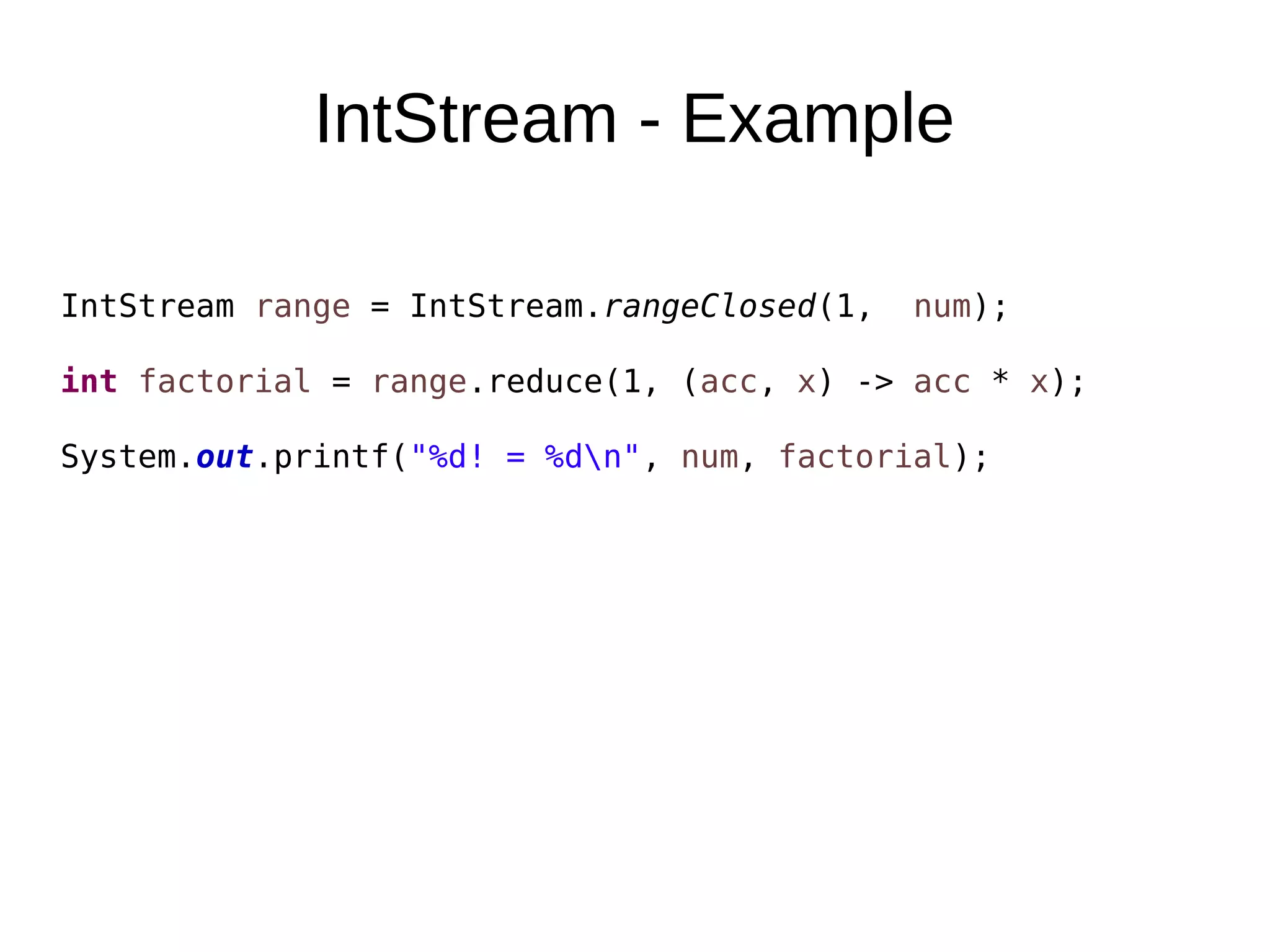
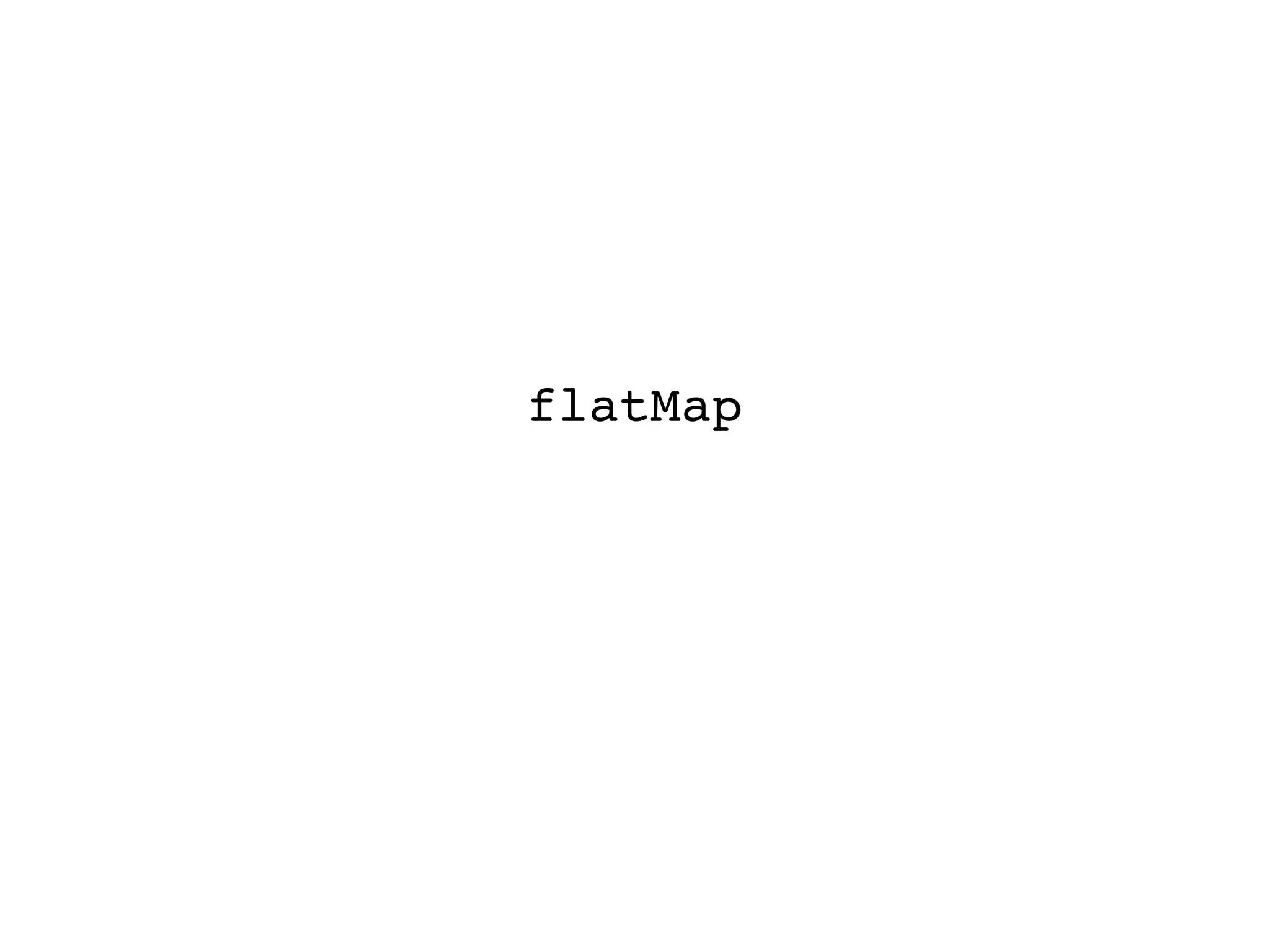
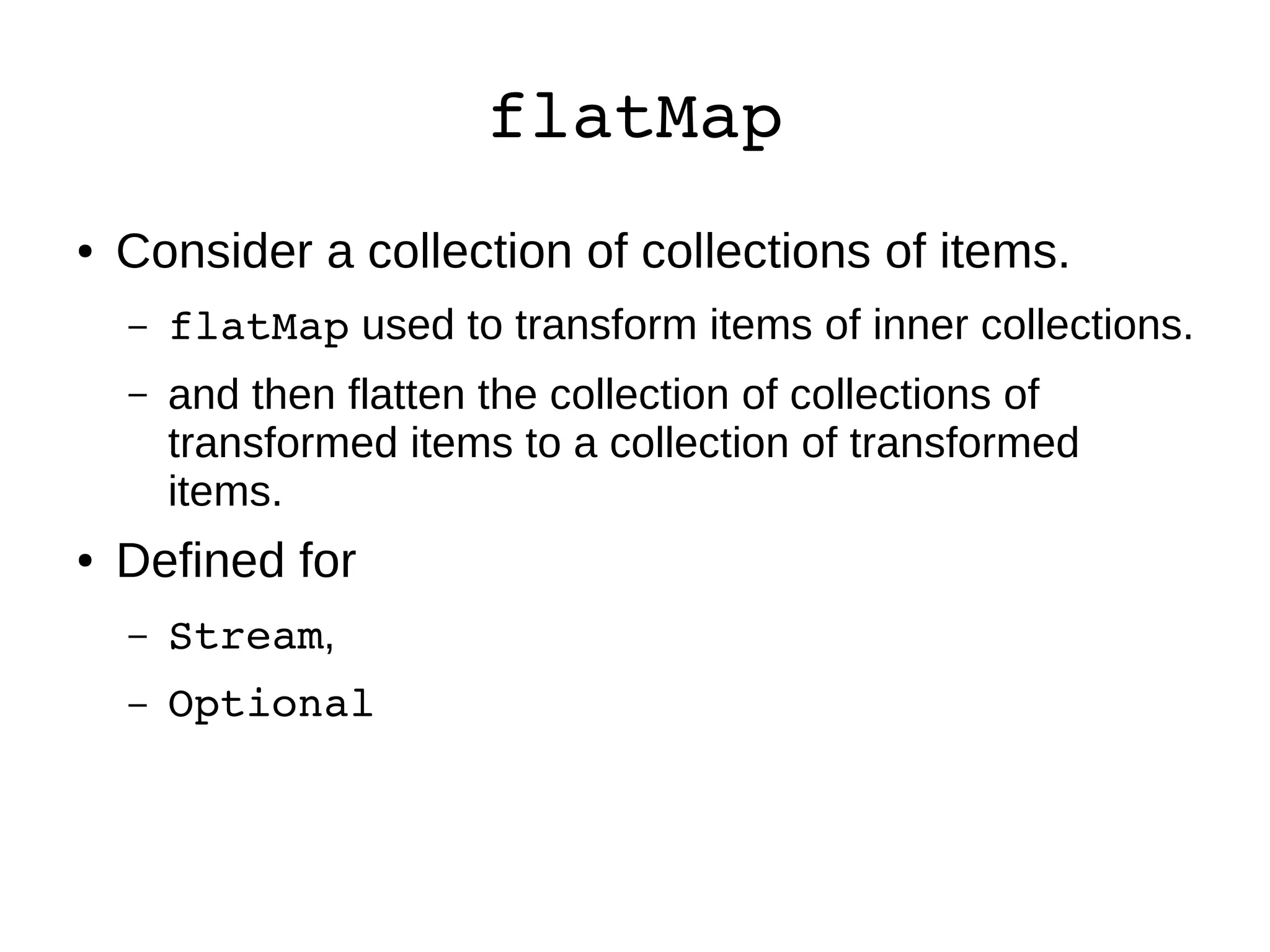
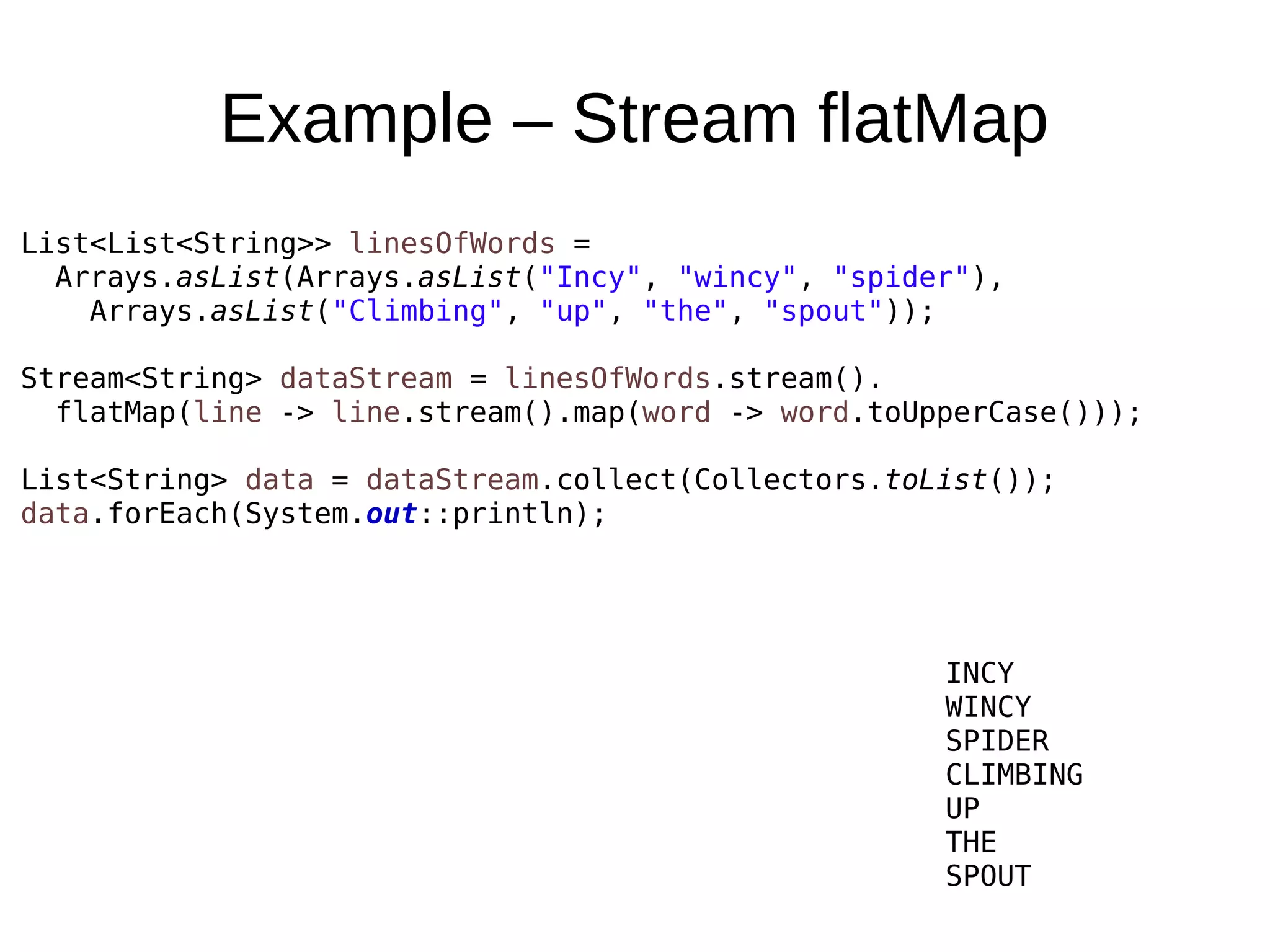
![Example – Flattening Optional Collections List<Optional<Integer>> nums = Arrays.asList(Optional.of(3), Optional.of(5), Optional.empty(), Optional.of(9)); System.out.println(nums); List<Integer> filteredNums = nums.stream(). filter(n -> n.isPresent()). map(n -> n.get()). collect(Collectors.toList()); System.out.println(filteredNums); [Optional[3], Optional[5], Optional. empty, Optional[9]] [3, 5, 9]](https://image.slidesharecdn.com/notes-160817213536/75/Functional-Programming-in-Java-8-42-2048.jpg)